Call us toll free 1-800-447-6496


Ph.D. in Jungian Psychology

RP 400 Essentials of Distance Education
This course is often the student’s first opportunity to try a distance learning format. It is designed to aid the student through his or her distance education journey. It will help the student know what is expected for distance learning and aid the student in finding the answers needed to accomplish this goal. Finally, this course will prepare the student on how to begin college writing.
MP 600 HUNA: Metaphysics of the Ancient Polynesians
This course looks into the theories of the origins of the Polynesian people, the breakdown of the ten elements of man, the prime directives of consciousness, and the three levels of Mana: three aka bodies, healing, and prayer.
MP 602 Wisdom from the East: Unlocking the Mystery of the Bible through Seven Keys
This course is designed to educate the student in Ancient Christian Scripture based on the Peshitta text (the most ancient Holy Bible). The student will gain a thorough understanding of the Bible through Seven Keys which are the combination lock for a new enlightenment. The student will learn the difference between the historical and spiritual significance of these ancient writings.
JP 606 Collected Works of Carl Jung
This course is designed to expose the student to an examination or a re-evaluation of the basic writings of Carl Jung.
MP 610 The Law of Your Higher Potential
Everything in nature conforms to basic law: the Law of Division and Growth. Since the beginning of time, the only method of increasing knowledge in nature has been to divide and grow. We all have a power inside of us that can bring us anything we really desire. The subconscious mind has a unique way of attracting to us whatever we hold near and dear to our hearts. This source has been called many names: the god within, inner wisdom, the superconscious, etc. This course is designed to teach the student the principles of higher potential and how to teach others to reach their highest potential.
PT 601 Psychopathology and Psychological Appraisal
The student will work with Theodore Millon’s masterwork on Psychopathology and the DSM-IV. The student will present clinical formulations based on case studies from the student’s actual practice. These formulations are developed into Theory Base Exposition Essays which demonstrate the application of personal, and professional expertise in the clinical setting.
PT 605 Clinic Practice: Dual Diagnosis
The use of Integrative Psychotherapy is examined in the context of Therapeutic Psychology in the contemporary clinic and private practice setting. The student will review interviewing, assessment, treatment, and survey patient variables, including personality traits and styles.
PT 607 Vocational Counseling
A vocation is the ultimate expression of a life’s work as well as the culmination of the individual psyche in its association with the world and others. This course examines the existential aspects of work as related to psychological health and psychopathology. A special emphasis is paid to psychopathic professions and an examination of psychopaths.
PT 608 Neuropsychology of Human Development
Neuroscience, the Medical Model and Biology are examined in this survey of the implications of contemporary neuropsychology. Human behavior and development adaptation are reviewed with an emphasis on clinical treatment models. The neurocognitive theory is explored.
PY 608 Death, Dying and Bereavement
One of the most difficult times in an individual’s life is the time of death. This course explores surviving the death of a loved one. It is about understanding and coping with loss. This course is both for the bereaved and the helping professional and it combines supportive personal case histories with step-by-step approaches to recovery.
RP 600 Data Gathering and Analysis
This course focuses on data collection from the standpoint of knowledge dissemination and utilization. This focus requires students to understand the process of data gathering from the perspectives of research and development, social science, and problem formation and solution. This course also reviews statistical inference and description. These competencies are addressed by topic in the course presentation.
RP 601 Research Methods
This is a survey course on research in the managerial, natural, and social sciences. It focuses on the whys and hows of doing research including the areas of experimental design, data collection, types of data analysis, and presentation of results. While we explore the kinds of analysis data are subjected to and when each kind is most useful for enabling us to draw reliable conclusions, there is no actual statistical analysis in this course.
RP 602 Professional Publishing Methods
Publishing one’s work in books, journals, or magazines can boost one’s career, but having an advanced degree does not guarantee that a person will be published. In this course, the student will learn how to develop ideas for publication in books, and professional and popular journals, how to sell those ideas to editors, and how to write books and articles in plain and understandable English.
RP 605 Research Project
The Ph.D. candidate will demonstrate, using standard research methods, new knowledge in a field of study that represents his/her degree path. A Précis, outlining the topic and a specific problem to be solved, must be submitted to the candidate’s committee for pre-approval. Depending on the nature of the research, the candidate will be required to prove or disprove a stated solution or theory through documented research, data gathering, and data analysis. A summation of the findings must be submitted in written form. The written research project will be included in the candidate’s dissertation as an appendix, with its own bibliography.
TH 610 Ph.D. Dissertation – 25,000 word minimum
Upon completion of the required credits of core curriculum courses at the 600 level, the student will prepare a 25,000-word dissertation in a publishable format following Westbrook University’s published guidelines. The dissertation will reflect the student’s theoretical and practical understanding necessary for their field of concentration. The dissertation will reflect the student’s newly acquired direction in his / her techniques and a presentation of a preferred approach in the field. Findings will be based upon the core curriculum of the course, however, the student will have ample latitude in using other sources as well. The goal of the dissertation will be for the student to bring in his contributions to the field of their concentration. The required research project will be an addendum to the dissertation.
You also might be interested in
- Clinical Counseling
RP 400 Essentials of Distance Education This course is often[...]
- Clinical Nutrition
- Psychodynamic Counseling
Degree Programs
- Addiction Counseling
- Human Services
- Holistic Nursing
- Natural Health Science
- Iridology and Nutrition
- Jungian Psychology
- Transpersonal Counseling
- Nutrition and Iridology
- Holistic Health Science/Iridology
- Ph.D. Health Science
- Clinical Psychology
- Transpersonal Psychology
- Psy. D. Psychology
- Doctor of Naturopathy
- Doctor of Integrative Medicine
Diploma Programs
- Natural Health
© 2024 · Westbrook University

- Psychology Programs

Analytical Psychology Degree Programs [2024]
Study analytical psychology.
Analytical psychology, also called Jungian psychology, is a school of thought within clinical and counseling psychology . It was founded by Carl Jung , a Swiss psychiatrist, as an offshoot of Freudian psychology.
Jung introduced concepts like the personal unconscious, collective unconscious, psychological complex, anima and animus. In trying to understand the human psyche, he stressed the importance of the unconscious aspects of the psyche and the power of dreams and archetypes.
In analytical psychology theory, everyone has a unique personal unconscious that serves as a counterbalance to the ego and the conscious personality. And everyone also has a collective unconscious that contains archetypes that are primordial and universal. The anima (the female archetype in a man’s unconscious) and the animus (the male archetype in a woman’s unconscious) are two such archetypes.
Jung didn’t consider analytical psychology as a complete method of psychotherapy for every patient. In Jung’s own psychiatric practice, he used Jungian psychotherapy for some patients, but found Adlerian or Freudian more useful for other patients. This liberal and flexible attitude was passed on to many Jungian therapists after him, and the field of Jungian psychology has broadened as a result.
Most analytical psychologists are either counseling psychologists or clinical psychologists ; the main difference between the two is that clinical psychologists normally treat patients who suffer from more serious conditions than counseling psychologists do.
A small number of analytical psychologists are primarily researchers, particularly those who work at universities, where they might also teach.
Analytical Psychology Degrees
Based on Jung’s psychological theories, analytical psychology programs help students understand the fabric of human thought processes and the human mind. By understanding the mind at large, analytical psychologists translate human behavior through the knowledge acquired. Jungian institutes have been formed and are dedicated to this sole degree and the Jungian school of psychology.
Unlike other psychology degrees, analytical psychology does not cover typical courses of research methods. These programs include courses such as fundamentals of analytical psychology, psychological interpretation of dreams, myths and pictures, psychiatry and theories of neurosis. In some cases, psychology with respect to religion is also studied.
Analytical psychologists first need to get a Bachelor of Arts degree in psychology . This degree might be sufficient for getting lower-level jobs in social work or counseling, but it is insufficient for becoming a licensed analytical psychologist.
Candidates then can either pursue their Master of Arts or Doctoral degrees in analytical psychology. The MA degree typically takes two years to complete.
Some institutions require state-specific requirements to be fulfilled on admission. While not necessary, candidates with backgrounds in psychiatric psychology may find their knowledge more applicable to analytical psychology.
A Master of Arts degree in clinical psychology is adequate for some jobs in social work and teaching, but university teachers must have a doctorate.
Most licensed analytical psychologists earn a doctorate in clinical psychology: either a Doctor of Philosophy (PhD) or a Doctor of Psychology (PsyD) . The latter is usually preferred for counselors, as it emphasizes courses in counseling, while the PhD offers more courses in research. Either doctorate is acceptable for teaching.
Some analytical psychologists gain a counseling license by taking a terminal master’s degree program in clinical psychology and then taking additional courses, training and placement work.
Career Opportunities
While some analytical psychologists teach or perform research, most of them counsel patients. Most counseling psychologists open their own private practice, while most clinical psychologists work in hospitals, substance abuse clinics, mental health care facilities or other health care facilities.
Analytical psychologists sometimes specialize in a particular area of psychology, such as only treating a particular type of disorder. Others specialize in their choice of clients, such as only treating adolescents. Still others specialize in a type of therapy, like mostly doing group therapy or family counseling.
Those who open their own private practice are more apt to specialize than those who work for institutions, mainly because they have more freedom in choosing their patients. But because it usually takes years to establish a good private practice, most analytical psychologists work for a regular paycheck for a few years until they can afford to start their own practice.
According to the Bureau of Labor, the mean annual wage of psychologists as of May 2023 is $106,420 .
Many counselors with a well-established private practice earn considerably more than this, though it might take several years to establish a lucrative practice. Those who work in private practice are also able to set their own hours; this lets them take time off if they don’t mind taking a pay cut.
Related Reading
- Career Options With a Degree in Clinical Psychology
- What Can You Do With a Degree in Counseling Psychology
- Difference Between General Psychology and Clinical Psychology
- Associate Psychology Degrees
- Bachelor's Psychology Degrees
- Master's Psychology Degrees
- PhD Psychology Degrees
- Online ABA Degrees
- Applied Psychology Degrees
- Business Psychology Degrees
- Behavioral Psychology Degrees
- CBT Therapist Degrees
- Child Psychology Degrees
- Child Therapist Degrees
- Child Life Specialst Degrees
- Criminal Psychology Degrees
- Counseling Psychology Degrees
- Developmental Psychology Degrees
- Educational Psychology Degrees
- Industrial Psychology Degrees
- Psychiatry Degrees
- Psychotherapy Degrees
- School Counseling Degrees
- Sports Psychology Degrees
- Trauma Psychology Degrees
- See More Programs
- Clinical Psychology Programs
- Cognitive Psychology Programs
- Forensic Psychology Programs
- Health Psychology Programs
- Mental Counseling Programs
- Social Psychology Programs
- Neuropsychologist Programs
- ABA Therapist Career
- Clinical Psychologist Career
- Cognitive Psychologist Career
- Counseling Psychologist Career
- Forensic Psychologist Career
- School Psychologist Career
- Social Psychologist Career


805.969.3626 ext. 305
Download the new jungian & archetypal specialization information guide.

Complete the form to access the Jungian and Archetypal Studies Specialization Information Guide.
- archetypes and the process of individuation
- the unique coursework in this specialization
- an academic format designed for the working student and the meaning behind the hybrid learning model
- the ways in which students are bringing this work into the world professionally and personally
Download Information Guide

Public Programs
Live Courses & Events
Self-Study CE Courses
Affiliate Courses
Training Programs
Analyst Training Program
Jungian Psychotherapy Program
Jungian Studies Program
Become a Member/Renew
About Membership
My Membership
Communities
Chicago Society of Jungian Analysts
Board of Directors & Staff
Professional Affiliates
Community News
All Downloads
My Downloads
CEs Available
Compilations
Browse Episodes
Podcast Shows
Institute Archives
Jung in the World
Healing Cinema
Jungian Ever After
Browse Posts
Speakers/Authors
Podcast Episodes
The Institute
Analytical Psychology
Continuing Ed & CEs
Parking & Transit
Library & Catalog
Payments & Receipts
Failed Orders
Downloading Purchases
Trouble Playing Videos
Opening Zip Files
Policies & Procedures
Refunds & Cancellations
Accessibility
Diversity, Equity, & Inclusion
Discrimination & Harassment
CSJA Ethics Code & Complaints
Grievance & Appeals
Terms & Conditions
COVID-19 Policy
Donate Online
Become a Member
Submit a Testimonial
View Our Donor Wall
› Training Programs › Jungian Psychotherapy/Studies Program
Jungian Psychotherapy Program & Jungian Studies Program
The Jungian Psychotherapy Program (JPP) and the Jungian Studies Program (JSP) are concurrent two-year programs where participants together study the fundamentals of Jungian theory grounded in experiential learning. The JPP/JSP training year, which runs from October to June, provides learners 144 hours of instruction in Jungian theory, 54 hours of Small Group, and 36 hours of Large Process Group*. Classes are taught primarily by Jungian psychoanalysts, with specialists utilized as needed based on their particular skill set. A clinically-oriented program, the JPP offers licensed mental health and social service professionals an opportunity to enrich and deepen their work through didactic and experiential learning in Analytical Psychology. The JSP, developed for highly motivated professionals in other fields, provides the opportunity to expand and deepen an understanding of Jungian theory and application of Jungian thought. Both programs participate together in theory instruction hours. Small Groups meet separately for each program, with a focus on clinical material for the JPP Small Group Case Consultation, and the JSP Small Study Group grounding the exploration of theory in its embodied expression.
Participants will learn what it means to think and conceptualize symbolically from a Jungian perspective. Coursework in the JPP/JSP will include many fundamental aspects of Jungian theory and practice, for example, dream interpretation, active imagination, sand tray, typology, transference and counter-transference, shadow and persona, the Self, archetypes, the collective unconscious, and the use of mythology and fairy tales in psychotherapy.
Continuing Education (CE) credit is available for coursework and Small Group sessions for JPP students. The Institute is approved by the Illinois Department of Professional Regulation to provide CE credits for psychologists, social workers, marriage and family therapists, and professional counselors. The C. G. Jung Institute of Chicago maintains responsibility for this program and its content.
The JPP/JSP cohort assembles at the Institute in Chicago one weekend a month, October through June, over the course of two years. The programs are designed to make Jungian education available to all qualified applicants. The one-weekend-a-month structure allows training to fit into one’s professional life. Our location in “the Loop” has convenient access to public transportation, both O’Hare and Midway airports, Ogilvie Transportation Center, and Union Station (Amtrak/Metra trains and long-distance buses). All classes and events are accessible.
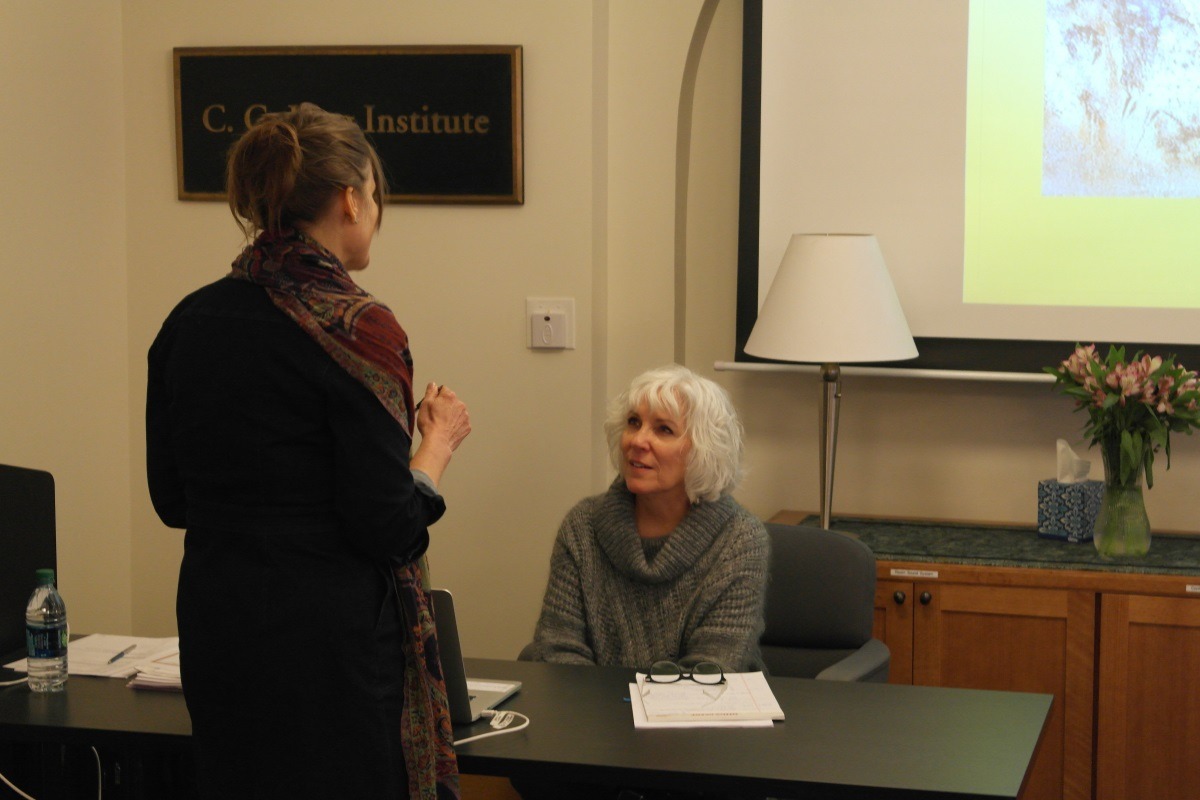
Who Should Apply
The JPP/JSP was developed for mental health and social service professionals, as well as for individuals with a strong interest in advancing their knowledge of Analytical Psychology. Please consider applying if you:
• Wish to learn Jungian theory in a warm collegial atmosphere that encourages deep personal and experiential learning as well as professional networking;
• Are looking for a continuing education program that will enrich and improve your competences through educational seminars and group process;
• Would like to participate in a stimulating learning environment where the faculty are Jungian psychoanalysts and the participants are professionals from a variety of cultural and educational backgrounds;
• Are interested in a time-limited program that is remarkable in providing education in Analytical Psychology while allowing participants to be employed full-time and, in some cases, to commute long distances.
The JPP is open to licensed clinicians, such as psychologists, social workers, counselors, marriage and family therapists, addictions counselors, physicians, and nurse practitioners, who desire to take their clinical approaches to a deeper level through group case discussion with a Jungian psychoanalyst. JPP applicants must be licensed in the state in which they practice psychotherapy, or must be under supervision for clinical work within an organization. Practicing clinicians must be covered by malpractice insurance, either individually or through an organization.
The JSP is open to professionals such as spiritual directors, chaplains, alternative health care providers, educators, and artists. JSP applicants may have personal, professional, or academic experience with the work of C. G. Jung, or an introductory familiarity coupled with a compelling desire to learn more. People who seek to engage with a community of readers, writers, thinkers, teachers, healers, makers, and others in the exploration of Jung’s contributions to the understanding of the psyche will be in good company here.
All JPP/JSP applicants must submit an application form and fee, 500-word essay, and curriculum vitae. Additionally, JPP applicants must provide current license and insurance documentation. Applicants will complete an interview with the JPP/JSP Co-Directors. See the Apply section for details.
Coursework: Instructional class size is limited. The courses include the history and fundamentals of Jungian theory as well as new developments by post-Jungian analysts, and other aspects of the practice of Analytical Psychotherapy. The following is a list of likely subjects to be covered:
- Jung’s Map of the Psyche: The World Within and the World Without
- The Ego and its Relationship to Consciousness and the Unconscious
- Levels of the Psyche (Conscious and Unconscious) According to Jung: Personal, Cultural, Collective
- Shadow and Persona
- Typology: Attitudes and Functions
- Anima/Animus: The Positives and Negative
- Archetypal Patterns: Use of Folk Tales and Myths in Psychotherapy
- Listening With the Third Ear: Associations and Amplifications
- Projection: Transference/Countertransference
- The Self: Central Archetype of Wholeness and Totality
- Active Imagination and Healing Through Creativity
- Dream work and Individuation

Small Groups: Following the full-cohort exploration of the course material in the morning and afternoon lectures, participants are divided into Small Groups. The relationships among the group members continue to develop for the duration of the two-year program, facilitated by Jungian analysts and psychotherapists. Small Groups are conducted separately for each program: JPP Small Group Case Consultation and JSP Small Study Group. For JPP students, group case consultation allows time and space to apply instructional materials to their clinical practice, personal experience, and the small group process. JPP members are expected to bring their own clinical work to the group for consultation. Through their Small Study Group, JSP students practice the application of Analytical Psychology, taking into account the group’s interests and dynamics. Based on participants’ topical requests and recommendations, skilled facilitators lead participants to explore the manifestations and implications of the course content in their personal and professional lives.
Final Project: In the second year of the JPP/JSP, students are required to write a 30-page paper exploring an area of Analytical Psychology of their choosing.
Faculty for the Jungian Psychotherapy/Studies Programs consists of members of the Chicago Society of Jungian Analysts (CSJA) and highly-regarded guest lecturers. To view the entire list of CSJA Members, click here.
The JPP/JSP meets in-person or on Zoom, one weekend a month, October through June (typically the first weekend of each month).
• During the Class Sessions, the JPP and JSP students gather for lecture and discussion with the instructors.
• Each day when the program breaks for lunch, students are encouraged to use this time for community building.
• Small Groups are conducted separately for each program: JPP Small Group Case Consultation and JSP Small Study Group.
• In the Large Process Group, the combined JPP/JSP cohort reassembles with the program Co-Directors.
• Participants can remain in contact in the period between the monthly training weekends via a Google Group hosted by the Institute. Syllabi and readings assignments are also distributed online, so participants must have computer/internet access and an e-mail address.
• When class sessions are in-person (Oct-Jan, Apr, Jun), all students are expected to attend in-person. Livestreaming will not be available for in-person weekends.
• When classes are on Zoom (Feb, Mar, May), the schedule will be the same as in-person weekends.
2023-2024 Calendar: The weekends for this coming year are set and can be viewed here: https://teamup.com/ks8654vbknxsi3j41v
Tuition for the 2023-2025 JPP/JSP will be $4,025 per year. At approximately 39 hours per trimester (24 instructional hours, 9 small group hours, and 6 large group hours), this calculates to approximately $34 per hour. Payment can be made in installments.
Continuing Education Credits: CEs are included in the price of tuition for all students. The Institute is approved by the Illinois Department of Financial and Professional Regulation to provide continuing education (CE) credit to psychologists, social workers, professional counselors, and marriage and family therapists. The C. G. Jung Institute of Chicago maintains responsibility for this program and its content. CEs are included in tuition.
Applications for the 2023-2025 JPP/JSP have closed. Applications for the 2025-2027 pcohort will open in Spring 2025.
The JPP/JSP application process is entirely online. Here are the steps:
1) Complete the JPP or JSP application online form
2) Pay the non-refundable $50 application fee
3) Read and e-sign the Character and Fitness Affirmation and Attestation
4) Upload your application materials
• 500-word statement describing your interest in pursuing training in Analytical Psychology
• Copy of your curriculum vitae
• Copy of your licensure in the state in which you are licensed to practice psychotherapy (JPP applicants only)
• Copy of your current malpractice insurance certificate (JPP applicants only)
When you submit your completed application form, you will receive an email inviting you to the next steps in the application process. After we have received all application materials, the final step in the process will be an interview with the JPP/JSP Co-Directors beginning June 5th and June 6th. We will send interview invitations by May 15. Applicants will receive notification of admission by July 1st and are asked to confirm their intention to proceed with JPP/JSP training by August 1st.
If you have any questions about the Jungian Psychotherapy Program or Jungian Studies Program, please contact the Operations Manager .
Operations Manager
Barbara Wahler, LCSW Email: [email protected] Phone: 312-701-0401
Frequently Asked Questions
Yes, we have now moved back to in-person events and the JPP/JSP meets in-person for all training weekends. Please read our Health & Safety Guidelines for In-Person Gatherings for more information about how we are addressing Covid-19.
Please read our Health & Safety Guidelines for In-Person Gatherings for more information about how we are addressing Covid-19.
October – In-Person November – In-Person December – In-Person January – In-Person February – Online March – Online April – In-Person May – Online June – In-Person
The JPP/JSP requires in-person attendance to participate in in-person weekends. Livestreaming is not available for in-person classes and group meetings.
In the event that meeting in-person is not an option due to COVID, the entire cohort will meet on Zoom.
CEs are included in the price of tuition for all students.
- 53 W. Jackson Blvd. Ste 438, Chicago, IL 60604
- 312.701.0400
- [email protected]

Certification of the Chicago Society of Jungian Analysts to train analysts is granted by The International Association of Analytical Psychology . The C.G. Jung Institute of Chicago is accredited as a psychoanalytic training institute by The American Board for Accreditation in Psychoanalysis, Inc . The Institute is approved by the Illinois Department of Professional Regulation to sponsor continuing education for Psychologists (License No. 268000106), Social Workers and Clinical Social Workers (License No. 159-000215), Marriage and Family Therapists (License No. 168-000123), Professional Counselors and Clinical Professional Counselors (License No. 197-000022).
- C. G. Jung Institute of Chicago
Don’t have an account? Register
This search engine will search our public programs , the Jungianthology Podcast & Blog , and our store .
To search only the store, visit our Store page .
If you’re looking for a Jungian Analyst, use our Find an Analyst search engine or browse the Chicago Society of Jungian Analysts page .
25 Best Online PhD in Psychology Programs
Explore online PhD Psychology programs. Compare schools and see your job prospects after graduation.

According to the Bureau of Labor Statistics, the need for psychologists has an estimated growth of 3%.
Editorial Listing ShortCode:
When you join the field as an expert in your discipline, you may be able to make between $76,000 and $116,000 per year.
Types of Online PhD Psychology Degrees
Psychology is a vast field, and psychology doctorates come in many forms. You can choose an online psychology degree path that’s specific to your research and career goals.
Choose the area that stands out to you to jump to that section.
Online PhD Psychology
Online phd behavioral psychology, online phd child & adolescent psychology, online phd clinical psychology, online phd educational psychology, online phd forensic psychology, online phd organizational psychology, online phd school psychology.
Each of these related subject areas can help prepare you for a different career path.

A generalist degree in psychology can be applied in many domains. You may choose this path if you want a degree that can serve you well in varied positions or fields.
This may also be a good option if you don’t feel like any specialty doctoral programs are particularly suitable for your career goals and would prefer to customize your own course of study.
During your studies, you will likely take classes in statistics; the mathematics and analysis skills that you learn there can help prepare you to conduct reliable research.
The courses in generalist psychology degrees cover a variety of psychology disciplines. Topics may include epigenetics, neuroscience, memory, cognition, and developmental psychology.
A psychology PhD can help equip you with leadership and research skills that are useful in a variety of career settings. For example, you might work as a school administrator, a behavior analyst, or a marketing manager.

If you’re interested in why people make the choices they do and how thoughts and behavior influence one another, then consider making behavioral psychology your field of study.
This degree gives students opportunities to research behavior analysis and learn about motivating others to change their patterns of action.
You will likely take classes that specifically focus on the field of applied behavior analysis. Other courses may cover related topics like addiction, language development, education, child development, or self-control. You may also learn about the history of psychology and behavior analysis.
This program may be offered as a licensure track to help prepare to become a Board Certified Behavior Analyst (BCBA).
After earning your online PhD in Behavioral Psychology, you may be able to conduct research in behavior analysis, supervise a team of behavior analysts or work directly with clients who have autism or developmental delays.

Working with kids and teens sometimes requires different skills and communication techniques than those needed when working with adults.
To expand your abilities to work with youths or conduct research among this age group, you’ll want to focus your studies on child and adolescent psychology.
Your classes will likely address developmental psychology and psychotherapy techniques to use when working with children and families. You may discuss how childhood crises like abuse and loss can have psychological effects throughout youth and beyond.
Related classes may cover how psychological principles can be applied in the juvenile correctional system and other difficult situations. You may complete a clinical internship in a child psychology facility.
This degree program may lead to licensure so that you can become a certified child or family psychologist. This career path can help you provide life-changing therapy services for youths in troubled situations.

Serious mental illness can make life challenging, but clinical psychologists can provide help and support. Whether you choose to conduct research in this field or work directly with patients, you can help people work through their struggles.
Common studies in this degree include developmental psychology and psychotherapy techniques. The courses are typically designed to address counseling ethics and improve clinical skills, like interviewing patients and conducting assessments.
Most programs require students to complete a year-long clinical internship for this degree; this component can help thoroughly prepare you for licensure.
Clinical psychologists often work directly with patients, particularly those with serious mental illnesses or behavior disorders. As you provide therapy, you may also conduct research projects and publish your findings.
You may choose to focus your clinical practice on a particular domain, such as health psychology or cognitive-behavioral therapy.
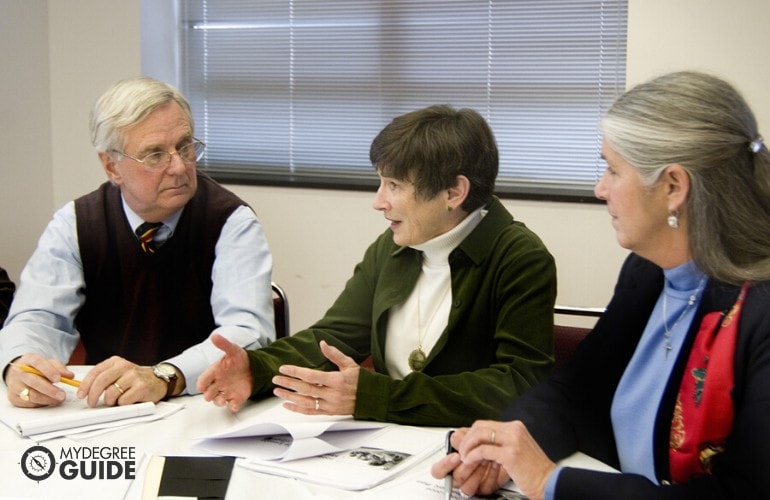
If you’re interested in furthering the science of learning, then a PhD in Educational Psychology may provide the foundation that you need. This branch of psychology deals with how people learn and how learning can be measured.
Common coursework in this doctoral program addresses educational theory and instructional methods. You should also study human development during childhood or throughout the lifespan.
To help you succeed in the realm of education, it may be important to cover topics like learning assessment, program analysis, and organizational leadership. You may also learn how to teach psychology to students.
A degree in educational psychology can help prepare you to lead institutions of learning. Some programs are geared toward working with adult learners, so you might do well as a college administrator.
You may also choose to work as a researcher who contributes toward a better understanding of how people assimilate new information.

Did you ever consider going into law instead of pursuing a psychology career? You can bring those two interests together with a doctoral program in forensic psychology. This discipline addresses psychology topics and issues that relate to law, criminal justice, and corrections.
Experts in forensic psychology need to be well-versed in abnormal development and behavior. Students of forensic psychology study tough topics like violence, terrorism, and arson.
Your studies may prepare you to deliver expert testimony, counsel offenders, support law enforcement officers, or carry out hostage negotiations. Helping people cope with the effects of criminal or violent acts may be another focus of your doctoral work.
As a leader in forensic psychology, you may be hired by a criminal justice organization or serve as a consultant. For example, you might coach witnesses, teach police officers how to respond in crises or work with criminal offenders.

Psychological principles can be greatly influential in the business world. Earning a PhD in Organizational Psychology can help you become a leader in the business world. This program can also be known as a PhD in Industrial and Organizational Psychology.
The curriculum for this doctorate may include both business and psychology classes. This doctorate focuses on organizational behavior and is designed to help students learn how to lead teams through change and navigate group behavior.
Other courses may address applying management techniques, motivating employees, conducting assessments, and compensating employees. You may be able to select a particular specialty for this doctoral program; options may include human resources or global business.
I/O professionals often hold leadership positions in businesses and other organizations. You could potentially assume a high level of responsibility in a human resources or project management department.
Alternatively, you might provide consulting services to organizations to help them improve morale or productivity.

Classroom teachers aren’t the only educational professionals who can have a significant influence on young learners. School psychologists also play an important role in students’ growth and learning, especially for students who struggle in a traditional classroom environment.
This program typically includes classes in learning and cognition, childhood development, and behavior disorders. Becoming familiar with conducting assessments, identifying delays, and strategizing interventions can help you succeed in a school setting.
You will probably need to complete an internship, which may last around one year. Individual states set regulations about licensure for school psychologists, so it’s important to select a program that aligns with your state’s requirements.
As a school psychologist, you’ll probably pursue employment in a school system. Your responsibilities may include supporting students in the special education program. Other career options include working as a researcher or an educational consultant.
Courses for an Online PhD in Psychology

As a doctoral student, your curriculum may be uniquely suited to your specialization and interests. There may be core courses that you are required to take as well as the opportunity to select electives of your choice. Example classes are listed below.
Cognitive Neuroscience – Studies in neuroscience address the relationship between the nervous system and behavior. Topics typically covered include memory, reasoning, and decision-making and how neurons, whether individually or as a group, become encoded.
Developmental Psychology – This course provides an overview of human development and the psychological changes that occur over a lifetime. Areas of study may include language development and social maturation.
Learning Theories – A class on learning can help you understand how people acquire information and retain it in their memories. Your studies may focus on young learners, adult learners, or a combination.
Psychology and Culture – This course explores the field of cultural psychology. The topics may include how humans internalize their culture of origin and how an individual’s culture shapes thoughts and actions.

Psychology Instruction – Once you have your PhD, you may want to work as a professor, so this course can help equip you with tools for teaching college students. It can help you learn how to conduct yourself in a classroom setting and how to build meaningful connections that will help students learn. You may complete a teaching practicum.
Psychopathology – This course provides an overview of mental and behavioral disorders. You may learn about identifying these disorders and providing effective therapies.
Research Methods – PhD programs are research-focused, so taking classes on research methods can help you sharpen your skills as a researcher. These classes can help you learn how to design studies, produce reliable results, and analyze the data.
In many programs, especially those of a clinical nature, you can expect to spend a year or more in practicum and internship settings. Your doctoral program is likely to include a research project or a dissertation as well.
What’s the Difference between a PsyD and PhD in Psychology?

A Doctor of Psychology (PsyD) is a professional doctorate for acquiring practical knowledge and skills for providing clinical services. Students in PsyD online programs spend significant time in practicum and internship settings to gain as much hands-on practice as possible.
Choosing this approach for your studies can help prepare you to provide psychological services to patients in individual or group settings.
A Doctor of Philosophy (PhD) in Psychology is a research-focused program. Although you may still complete internships in the psychology field, they may not be until close to the end of your studies. Instead, you’ll likely spend more time on research skills, statistics, and data analysis.
If you have your sights set on a full-time career in research or academia, this is typically the right educational path to select. Becoming licensed may be a possibility, but only some PhD in Psychology programs are licensure tracks.
Ultimately, the difference between PsyD vs. PhD comes down to the type of career you want to pursue in the psychology sector.
What’s the Difference between a PhD Psychology and a PhD Counseling Psychology Online?

A PhD in Psychology is a general program that can give you insight into human thought and behavior. A generalist psychology degree is often a non-licensure track.
It can be useful for those who want to teach psychology at the college level, become researchers, use their psychology knowledge in business or organizational leadership, or serve as consultants.
For those who want to work directly with clients, a PhD in Counseling Psychology may offer a path to licensure. This degree program typically includes classes on counseling practices, group therapy, abnormal development, and psychological assessments.
You will probably have to engage in a lengthy internship experience as well. If you want to see patients in private practice or as a member of a healthcare team, it’s a good idea to choose a PhD in Counseling Psychology, a PhD in Clinical Psychology or a Doctor of Psychology program.
PhD in Psychology Job Outlook and Salary
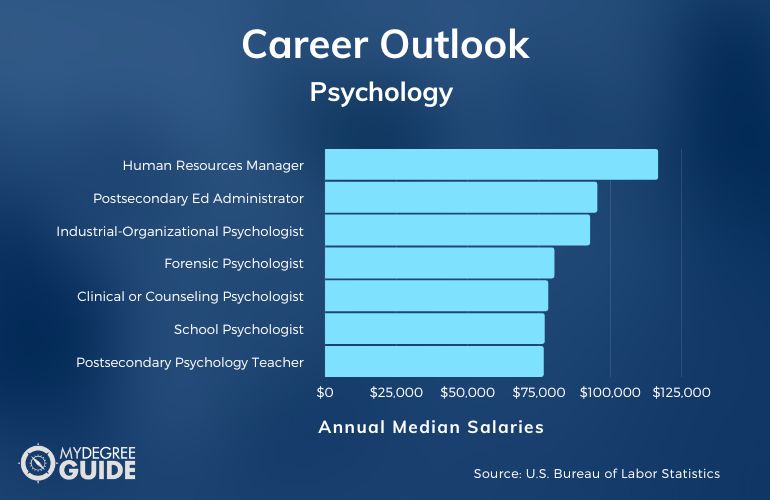
Psychology is a growing field. The U.S. Bureau of Labor Statistics expects a 3% growth rate for psychologist positions for the next ten years. This job category includes clinical, counseling, school, and industrial-organizational psychologists as well as other specialists in this field.
Earning your doctorate may qualify you to seek licensure, apply for a promotion, or move to a different organization. An increase in pay may accompany those changes.
Professional Organizations for those with a PhD in Psychology

Whether they conduct research, lead organizations, or work with clients, psychology professionals can benefit from the support of others in the field. Membership in a professional organization can provide opportunities to learn from others and grow your skills.
- American Psychological Association – APA is open to all who work in the field of psychology, including those in clinical practice and academia. Membership benefits include access to a psychology news app and an exclusive journal as well as discounts on professional resources.
- American Psychiatric Association – Also known as APA, this organization is for practicing psychiatrists and those who teach or conduct research in this field. Membership benefits include access to print and online publications, discounts on industry resources, and free continuing education classes.
- Association for Psychological Science – APS advocates for psychological research and practice to be based on a strong scientific foundation. Researchers, clinicians, teachers, and other psychology professionals are welcome to join. Members are sent digital and print newsletters and journals. Plus, they can access a job board and may want to attend the organization’s conventions.
- National Association of School Psychologists – NASP advocates for policies and practices that benefit students’ safety, health, and academic success. Members are invited to join some of the organization’s interest-based subgroups and have access to newsletters, journals, and downloadable handouts.
- Society for Neuroscience – SfN provides professional support and public advocacy for the neuroscience community. If you work in neuroscience, you may want to join the group for career resources, free and discounted publications, and reduced costs for the organization’s annual meeting.
Membership benefits vary from one organization to the next. To try out a group membership without committing to the full registration fee, consider enrolling during your doctoral program. It’s common for professional associations to offer discounted student memberships to people who are in school.
Certification and Licensure Following a Doctoral Psychology Program

Not all psychology PhDs pursue licensure, but it’s an important step for those who plan to engage in clinical practice. The following overview can provide a general idea of the steps you’ll need to take.
- Enroll in a doctoral degree program. Choose a licensure PhD track — perhaps at a school that is accredited by the American Psychological Association.
- Pass the Examination for Professional Practice in Psychology and any other tests required by your state.
- Earn clinical hours. While you may be able to earn some of these during school, many will have to be acquired during your postdoc period.
- After finishing your degree, passing required tests and earning professional hours, apply for licensure with your state.
Each state sets its own licensure regulations; consult your state’s board to learn more about the specific steps that you’ll need to take. It’s also important to choose a program that complies with your state’s licensure requirements.
Accreditation for an Online PhD Psychology
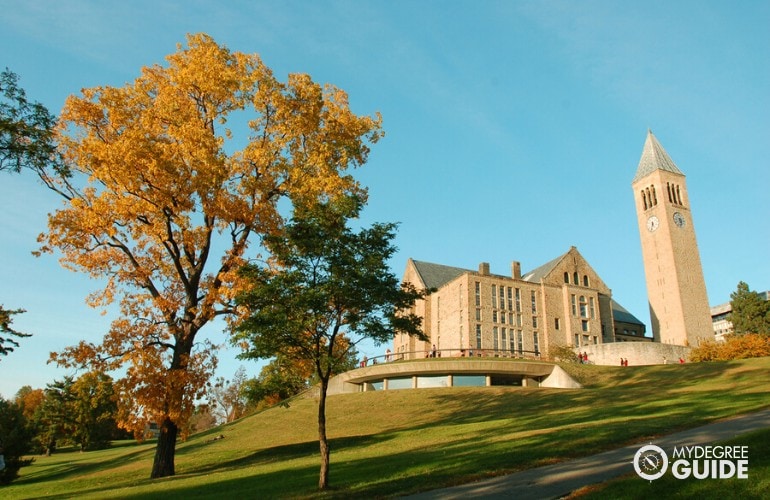
You’ll likely put a lot of time and money into earning your PhD in Psychology. It’s important that you receive a reputable degree in exchange for all that work. That’s why you should always make sure that your university holds proper accreditation.
Regional accreditation is one important distinction to consider. Any school focused on delivering quality academics will have applied for regional accreditation. Accrediting bodies grant this recognition to schools that consistently provide good learning experiences and opportunities for their students.
To ensure that your college meets this standard, look for accreditation from:
- Higher Learning Commission (HLC)
- Middle States Commission on Higher Education (MSCHE)
- New England Commission of Higher Education (NECHE)
- Northwest Commission on Colleges and Universities (NWCCU)
- Southern Association of Colleges and Schools Commission on Colleges (SACSCOC)
- WASC Senior College and University Commission (WSCUC)

Without regional accreditation, you have no guarantee of receiving a quality education. Your degree probably won’t mean much to employers or other schools.
For a doctoral program in psychology, it’s sometimes advised to look for schools that are also accredited by the American Psychological Association .
According to the Council for Higher Education Accreditation and the U.S. Department of Education, APA has the authority to determine whether psychology programs meet industry standards and thoroughly prepare students for clinical practice and other psychology careers.
APA accreditation may not be essential if you don’t plan to seek licensure. In some states, though, only students with an APA-approved doctorate are eligible to become licensed psychologists.
Financial Aid for PhD Psychology Students

Doctoral programs are expensive, but financial aid can put a PhD within your grasp.
There are government programs that exist specifically to help students fund their education. These include grants, low-interest loans, and work-study arrangements. You may be able to use both state and federal funding.
To learn about your eligibility for government help, submit the Free Application for Federal Student Aid (FAFSA) .
As a doctoral student, you may qualify for other types of help as well. Your school may reduce your tuition in exchange for teaching lower-level classes. You may also receive scholarships or fellowships from your college, industry associations, or other community or national organizations.
If you need additional help, look into spreading out your payments. Private loans can make it so you won’t have to pay the full tuition cost right away.
Just keep in mind that private interest rates are usually higher than they are for government loans, so it’s smart to max out other types of financial aid first. You can also ask your school about the possibility of establishing a payment plan.

Questions Related to Earning PhD in Psychology Online
Here are our answers to a few more questions you might.
Can You Do a PhD Online?
Yes, you can do a PhD online. Many schools offer online PhD programs that are reputable, regionally accredited, and comparable to their on-campus counterparts.
Online PhDs are available in a vast number of disciplines, including psychology. Although these programs allow you to take classes and submit coursework online, you may need to complete in-person practicums or internships.
Can You Get a PhD Online in Psychology?
Yes, you can get a PhD online in Psychology. There are a number of colleges that offer online programs for studying psychology at the PhD level.
These programs can help equip you with the in-depth knowledge needed to lead organizations, spearhead change, conduct research, develop new theories, or teach students. Some online PhD in Psychology programs may prepare you for licensure.

Is a PsyD or PhD Better?
Both of these options can be valuable degrees. Which one you should get depends on your career goals. Consider choosing a PsyD if you know you want to be a counseling practitioner. Consider getting a PhD if you enjoy statistics, and your goals include becoming a researcher or a college faculty member.
Are Online PhD Programs Accredited?
You should have no trouble finding an online PhD program with regional accreditation. Accrediting bodies confer this status on online schools just like they do for on-campus programs.
Programmatic accreditation for online psychology programs is harder to come by, though — especially when it comes to APA accreditation. Hybrid programs are more likely to hold APA accreditation than fully online ones.
Are There Any APA Accredited Online PsyD Programs?

Although online PsyD programs are eligible for APA accreditation, just like on-campus programs, the organization has not given lasting accreditation to any fully online programs.
Instead, you may want to look into a hybrid PsyD program so that you can earn some of your credits in a flexible online format.
List of Schools Offering Online PhD Psychology Programs
Methodology: The following school list is in alphabetical order. To be included, a college or university must be regionally accredited and offer degree programs online or in a hybrid format.

Alaska Pacific University is a liberal arts and sciences university in Anchorage, Alaska. It was established in 1957.
Alaska Pacific University’s Doctor of Psychology in Counseling Psychology is designed to meet the needs of working professionals seeking the academic requirements to work as a licensed psychologist Classes are delivered through synchronous online evening classes and intensive on-campus classes.
- Doctor of Psychology (Psy.D.) in Counseling Psychology
APU is accredited by the Northwest Commission on Colleges and Universities.

Arizona State University is one of the largest universities in the United States in terms of enrollment. It has 5 campuses across the Phoenix metropolitan area, with 4 learning centers in Arizona.
ASU offers a Doctorate in Behavioral Health program, which features specialized coursework focusing on teaching evidence-based behavioral interventions. It comes with a 400-hour internship for students who are licensed as behavioral, medical, or professionals.
- Online PhD in Behavioral Health
ASU is accredited by the Higher Learning Committee (HLC) of the North Central Association of Schools and Colleges.

California Institute of Integral Studies is based in San Francisco, California. It consists of four schools: the School of Professional Psychology & Health, the School of Undergraduate Studies, the American College of Traditional Chinese Medicine, and the School of Consciousness and Transformation.
The school offers an online PhD program in Integral and Transpersonal Psychology. It aims to deepen learner’s skills and make relevant contributions to shaping their areas of specialization. Students need to complete 36 units for a period of 3 years.
- online PhD in Integral and Transpersonal Psychology
CIIS is accredited by the Western Association of Schools and Colleges (WASC).

California Southern University was founded in 1978 and is located in Costa Mesa, California. It offers programs at the associate, bachelor, masters, and doctoral levels.
California Southern’s Doctor of Psychology degree program is applied, clinically focused, and meets the educational requirements for licensure as a clinical psychologist in California.
The program can be completed in 4 years with all the coursework taken online. Students will also be required to do a practicum at approved local sites.
- Doctor of Psychology (PsyD)
CalSouthern is accredited by the Western Association of Schools and Colleges (WASC).

Capella University delivers most of its courses online. It is headquartered in Minneapolis, Minnesota and was established in 1993. Presently, it offers 52 degree programs wig more than 1,900 degree courses.
The university’s PhD in Psychology online program is designed to give professionals the tools to take advanced roles in areas such as psychology, mental health, business, education, or public policy.
Areas of specialization include General Psychology, Behavior Analysis, Developmental Psychology, Educational Psychology, and Industrial/Organizational Psychology.
- Online PhD in Clinical Psychology
Capella U is accredited by the Higher Learning Commission.

Duquesne University is a Catholic university located in Pittsburgh, Pennsylvania. It takes pride in its commitment to providing high-quality education that emphasizes both intellectual and ethical development.
Duquesne University’s PsyD in School Psychology is a 91-credit program that trains students in evidence-based practices founded in scientific literature and theory.
The curriculum employs aspects of multiculturalism and diversity, conducting consistent outcomes assessments for program improvement and support.
- Psy.D. School Psychology
Duquesne is accredited by the Middle States Commission on Higher Education

Felician University, a Catholic university in New Jersey, has campuses in Lodi and Rutherford. It was founded in 1923 by the Felician sisters.
The university’s Doctorate in Counseling Psychology conducts classes at Lodi campus and online. It prepares graduates to become entry-level health service psychologists and license-eligible psychologists in New Jersey.
The training focuses on developing the necessary skills required to work as a psychologist and an independent practitioner.
- Doctorate in Counseling Psychology
Felician University is accredited by the Middle States Commission on Higher Education.

Fielding Graduate University in Santa Barbara, California offers postgraduate and doctoral degree programs that are primarily delivered online.
Fielding Graduate University offers a doctoral program in Clinical Psychology. The program includes online and in-person seminars, week-long residential sessions, meetings with faculty and other students in your region, research, and clinical training experiences.
- PhD in Clinical Psychology
Fielding Graduate University is accredited by the WASC Senior College and University Commission (WSCUC).

Grand Canyon University is a non-denominational Christian university in Phoenix, Arizona. It was founded in 1949.
The university offers a PhD in General Psychology with an emphasis in Cognition and Instruction. It is designed to help those who wish to work with adult education in economically and culturally diverse communities. The coursework includes studying social cognition and assessments.
- PhD in Psychology: Cognition & Instruction
GCU is accredited by the Higher Learning Commission (HLC).

Keiser University is based in Florida, and it offers educational programs at the undergraduate, graduate, and doctorate levels. These programs can be completed in both traditional and online formats.
The Doctoral Program in Psychology follows a scholar-practitioner model that allows students to integrate scholarly research with classroom expertise. It aims to challenge and develop students with rigorous coursework and relevant teaching and research activities.
- Psychology, PhD
Keiser U is accredited by the Southern Association of Colleges and Schools Commission on Colleges

Liberty University, located in Lynchburg, Virginia, is one of the world’s largest Christian universities in the world. It offers more than 600 degrees at the undergraduate, graduate, and doctoral levels.
Liberty University offers the PhD in Psychology degree program with an emphasis on Industrial/Organizational Psychology, which provides training in the study of human behavior in the workplace. It has 60 credit hours and can be completed within an average of 3 years.
Classes are done 100% online in 8-week courses.
- Online Ph.D. in Industrial/Organizational Psychology
Liberty U is accredited by the Southern Association of Colleges and Schools Commission on Colleges.
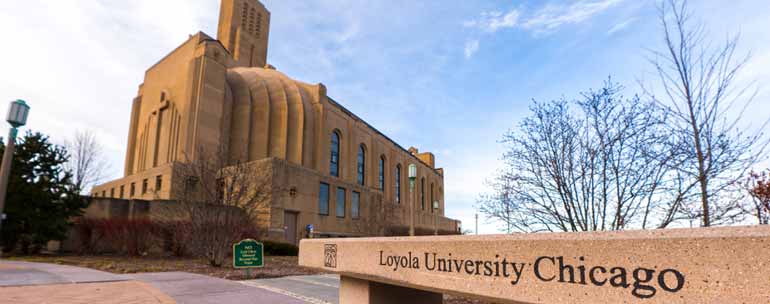
Loyola University Chicago is a Catholic university in Chicago, Illinois. It was founded by the Jesuits in 1870.
The university offers a PhD in Counseling Psychology, which allows graduates to be eligible for the Clinical Psychologist Licensure Examination. It trains students to develop an in-depth understanding of various issues related to cultural diversity and social justice.
Typically, the program takes four to five years of study.
- PhD in Counseling Psychology
Loyola is accredited by the Higher Learning Commission (HLC).
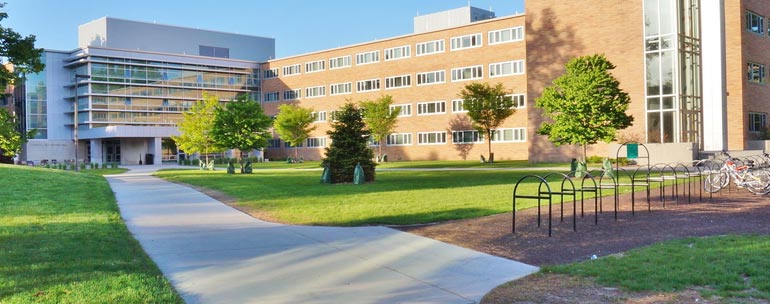
Michigan State University was founded in 1855 and was first named the Agricultural College of the State of Michigan. Presently, MSU is one of the largest universities in the country in terms of the student population.
MSU offers a hybrid format of the PhD in Educational Psychology and Educational Technology. It is a rigorous, five-year program of study completed primarily online.
The program aims to develop educational leaders who comprehend the need to create technologically sound pedagogies based on innovative research and practice.
- Ph.D. in Educational Psychology and Educational Technology
MSU is accredited by the Higher Learning Commission.

Founded in 1971, National University is a network of nonprofit educational institutions headquartered in San Diego, California.
NU offers a 100% online program for a PhD in Psychology that is designed to answer the growing interest in the field of psychology. It seeks to prepare graduates to stand out and excel in the profession. Training includes applied experiential learning with case studies, scenarios, and real-life situations.
It requires the completion of 60 credit hours and can potentially be completed in 46 months.
- PhD in Psychology Online
National University is accredited by the Western Association of Schools and Colleges.

Oregon State University is Oregon’s largest university with over 32,000 students from all over the country and across the globe l.
The university’s PhD in Counseling program is designed to equip students with the necessary knowledge and skills to work as clinical supervisors, advanced practitioners, and counselors in clinical and academic settings. The program is offered in a “hybrid” format, which involves both face-to-face and online instruction.
- Ph.D. in Counseling
Oregon State is accredited by the Northwest Commission on Colleges and Universities (NWCCU).

Pacifica Graduate Institute was founded in 1976 and has two campuses in Santa Barbara, California.
The school offers the PhD Jungian Psychology and Archetypal Studies degree program, which is anchored on the works of C.G. Jung and James Hillman.
In this degree program, students can study different approaches to the psyche that foster healing, creativity, self-expression, transformation, and the development of consciousness.
- Online Ph.D. Jungian Psychology and Archetypal Studies
Pacifica Graduate Institute is accredited by the Western Association of Schools and Colleges.

Regent University was founded in 1978 and is located in Virginia Beach, VA. It has 135 programs at the associate, bachelor’s, master’s, and doctoral levels – all taught from a Christian perspective.
The university’s Doctor of Education in Educational Psychology degree program allows for a broad area of academic inquiry.
Students can explore and study topics like the psychological foundation of learning, creating environments conducive to learning, cognitive strategies for learning in children and adults, brain research, teacher education, faculty roles, and professional development in different settings.
- Doctor of Education – Educational Psychology
Regent is accredited by the Southern Association of Colleges and Schools.

Saybrook University, established in 1971, is located in Pasadena, California.
The Online PhD in Psychology degree program at Saybrook University is designed to help individuals succeed professionally in a variety of areas, including education, the juvenile justice system, community health centers, corporate offices, and non-profit organizations.
Specializations include Consciousness, Spirituality, and Integrative Health; Creativity Studies; Existential, Humanistic, and Transpersonal Psychology; and Psychophysiology.
- Online Ph.D. in Psychology
Saybrook University is accredited by the Western Association of Schools and Colleges.

Sofia University is located in Palo Alto, California, and was established in 1975 by James Fadiman and Robert Frager.
The university’s Doctor of Philosophy in Transpersonal Psychology is a 75-unit degree program that is delivered fully online. The average completion length is 3 years. It provides a unique and extraordinary opportunity to study the theories and practices of transpersonal psychology.
Students can work closely with faculty members who provide exceptional support and facilitate social and emotional development.
- Ph.D. in Transpersonal Psychology
Sofia University is accredited by the Western Association of Schools and Colleges (WASC).

Texas Tech University, established in 1923, offers over 150 courses through 13 colleges.
The university’s PhD in Educational Psychology is designed to provide learners with a comprehensive knowledge of educational foundations, learning, motivation, and development. It aims to prepare individuals for careers in educational research and various academic career positions. The program has 91 credit hours.
- Educational Psychology – PhD
Texas Tech is accredited by the Southern Association of Colleges and Schools Commission on Colleges

The Chicago School of Professional Psychology is a global innovator in the field of Psychology for over 40 years.
The school offers a PhD in International Psychology with Trauma Services Concentration. It is a full-time, online degree program with 3-4 years length of completion.
It is designed to help students acquire the skills necessary to lead organizations in developing prevention training and establishing programs to address different issues in mental health caused by traumatic experiences.
- Ph.D. in International Psychology Trauma Services Concentration
The Chicago School of Professional Psychology is accredited by the Western Association of Schools and Colleges (WASC).
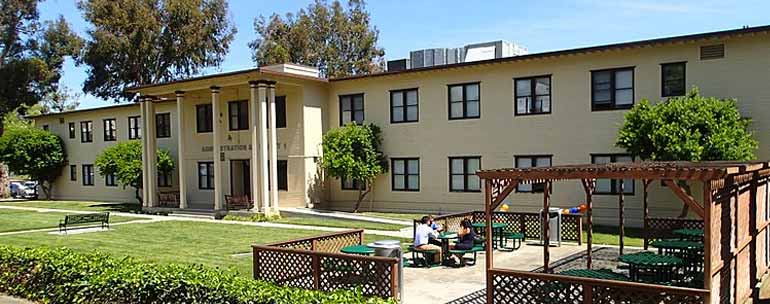
Touro University Worldwide offers flexible online programs and courses at an attainable rate.
The university’s Online Doctor of Psychology in Human and Organizational Psychology aims to help students to gain a better understanding of what motivates their workforce.
It is designed to give professionals the skills and tools required to design evidence-based solutions in their organizations. It can be completed 100% online with affordable tuition rates.
- Online Doctor of Psychology in Human and Organizational Psychology
Touro University Worldwide is accredited by the WASC Senior College and University Commission (WSCUC).
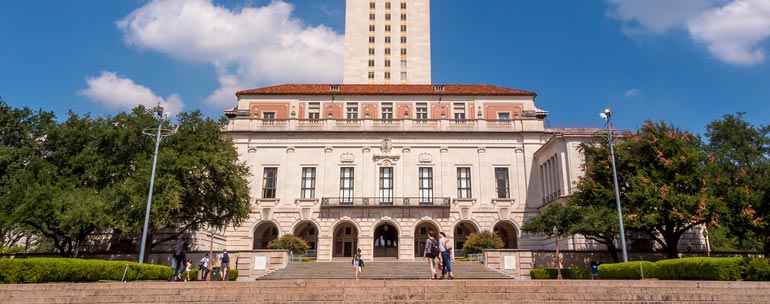
The University of Texas at Austin, founded in 1883, is the flagship university of the University of Texas System.
The university’s Department of Psychology PhD program brings together the best faculty and staff to provide graduate and undergraduate students the support needed to fulfill the school’s scientific and educational missions.
The school’s graduate program and Clinical program both ranked #8 in US News & World Report’s list.
- Ph.D. Program in Psychology
The University of Texas at Austin is accredited by the Southern Association of Colleges and Schools Commission on Colleges.
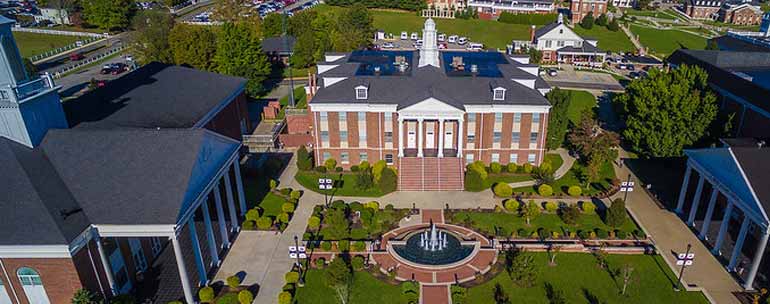
The University of the Cumberlands is a Christian university in Williamsburg, Kentucky. It was founded by Baptist ministers in 1888.
The university offers the PhD in Clinical Psychology program, which is designed to help students develop the skills required to obtain licensure as a psychologist in the Commonwealth of Kentucky as well as in other states.
It is a four-year program that lets students actively participate in clinical instruction, clinical practicum, and doctoral dissertations.
- Ph.D. in Clinical Psychology
The University of the Cumberlands is accredited by the Southern Association of Colleges and Schools Commission on Colleges.

Walden University has been offering degrees and certificates in various undergraduate and graduate programs for over 50 years. Programs offered reflect market trends and enable adult learners to achieve their educational goals.
Walden University offers a PhD in Psychology program. It gives opportunities for students to achieve post-graduation success and empower them to excel as researchers, educators, or consultants. It is offered completely online and has 55 credit hours.
- Ph.D. in Psychology
Walden U is accredited by The Higher Learning Commission (HLC).
Is a PhD in Psychology Worth It?

Yes, a PhD in Psychology worth it for many students. According to the Bureau of Labor Statistics, the job market in life, physical, and social science is projected to grow by 5% for the next decade. Common careers in this field include school psychologist, forensic psychologist, industrial-organizational psychologist, postsecondary education administrator, and human resources manager.
If you have a keen interest in how people think, act, and develop, then consider soaking up as much knowledge on the topic as you can by enrolling in an online PhD in Psychology program.
Earning your doctorate can help elevate you to expert status in this field and prepare you to teach students, perform original research, and make a significant difference for individuals or organizations. Getting your doctorate may also qualify you to pursue licensure in your state.
Now is the time to apply to online psychology schools. A fulfilling career as a professional psychologist may be waiting for you.

- Skip to primary navigation
- Skip to main content
The C.G. Jung Institute of Los Angeles
Dedicated to the study and dissemination of the views of C.G. Jung
- Search this website
- Login/Register
- Patient Portals
Cost: $180/session payable online before each session.
Refund requests must be sent by email at [email protected] before Friday, 12:00 pm prior to the program paid for. No refund will be issued otherwise.
The last session will be free for attendees who participate in the first 9 sessions.
To apply, please complete our application form. (you will need to create an account on this page to access the form.)
Certificate Program in Jungian Studies
For non-clinicians, september 2020 – june 2021, (videoconference + in-person).

Certificate: A Certificate in Jungian Studies will be awarded to participants after completion of the program. Participants may miss 2 classes at most and still receive the certificate.
Due to the current corona pandemic, the format of this program is hybrid: online through a secure videoconference service, and in-person if /when speakers and most attendants can be present in the same room. A number of places will be reserved for online-only attendees from other states.
Continuing Education credits are not available for this program.
Schedule of Seminar Courses
Saturday, September 26, 2020
An introduction to jung’s key concepts.
Presented by Marlene Frantz, M.A., M.F.T.
The morning session will begin by taking time to introduce ourselves, share the path that led each one of us here, and explore some of the similarities and differences between our histories and our interests. We will then move into an introduction of some of Jung’s key concepts presented in T wo Essays on Analytical Psychology such as the persona, the ego, the shadow, the anima and animus, the collective and personal unconscious, the Self, the spirit of the times and the spirit of the depths.
In the afternoon we will turn our attention to the spirit of the times and how the current moment that we are living through is affecting us collectively and as individuals. Students are encouraged to spend time before class thinking about what comes when they look through current events like the Black lives Matter movement and the global pandemic through a Jungian lens
Marlene Frantz, M.A., M.F.T., is a Jungian analyst, a group psychotherapist and an equine therapist in private practice in Santa Monica and Topanga, California. She has contributed articles and been a featured artist in Psychological Perspectives ; is a member of the teaching faculty of the C.G. Jung Institute of Los Angeles and Jung in Ireland; and has lectured on creativity, grief, facing mortality, and equine therapy. In addition, she has lead groups and workshops in Los Angeles on the creative process, dreams, uncovering personal rituals around food, and rebuilding one’s life after loss.
Saturday, October 17, 2020
Individuation and the realization of the self.
Presented by Stephen Kenneally, M.A., M.B.A., M.F.T.
Individuation—the lifelong development of the personality—is central to Jung’s psychology. It is the process of realizing a distinctive expression of oneself that is often symbolized as a heroic quest for transformation and the achievement of wisdom. While aspects of this concept have been embraced by popular culture, Jung’s individuation describes a far more intricate process of self-realization that involves a deepening relationship to one’s unconscious with the help of Jung’s concepts of shadow, anima, complexes, archetypes, and Self.
The class will cover the theory i n the morning and use the afternoon to do some experiential exercises to demonstrate ways to deepen one’s relationship to the unconscious and to facilitate one’s individuation.
Stephen Kenneally, M.A., M.B.A., M.F.T is a Jungian analyst practicing in Santa Monica, CA. He worked in finance in NYC and in 1998 left Wall St. and moved to the Shalom Mountain Retreat Center in upstate New York where he trained in bio-energetics, group counseling, and Jungian psychotherapy. In 2000, Stephen moved to Los Angeles to further his training at Pacifica Graduate Institute, Counseling West, and the C.G Jung Institute of Los Angeles. He currently divides his time between his private practice in Santa Monica, teaching at Antioch University, his supervisory and committee work at the Institute, and his family.
Saturday, November 21, 2020
Somatic perceptions through a jungian lens: using the body to dialogue with the unconscious.
Presented by Athena A. Carrillo, M.A., M.F.T.
Similar to dream analysis, one might approach the body as a means of engaging the unconscious and the tension of opposites through a somatic expression of an internal experience. Jung described the process of psychoanalysis as the union of these opposites which ultimately allows the individual a relationship with the larger Self and greater connection with the whole of the personality.
In the morning session, we will discuss some of Jung’s writings pertaining to the unconscious, the tension of opposites, and their union in the “transcendent function.” The afternoon session will be an opportunity to experience these concepts through the body, utilizing active imagination and Kundalini yoga, in which Jung found parallels.
Athena A. Carrillo, M.A., M.F.T. is a Jungian analyst in private practice in Eagle Rock who is also certified in Kundalini yoga. She specializes in working with adults addressing childhood trauma. While a pre-medicine student and physical therapy assistant, Athena began to perceive in patients the connection between their physical symptoms and psychological trauma, in succession with intuitive experiences of unconscious-unconscious communications between herself and her patients. Her passion for exploring this interconnection led to a master’s degree in body-oriented psychotherapy at John F. Kennedy University, where she discovered a deep resonance with Jung’s work, which eventually led to her training as a Jungian analyst.

Saturday, December 12, 2020
Jung’s typology .
Presented by Steven Galipeau, M.A., M.Div.
Jung’s interest and evaluation of human typology first emerged during his association with Freud, his dialogues with Han Schmid-Guisan, and then developed further through his profound inner experiences as reported in The Red Book . Psychological Types was his first major work after this period of his life . We will examine the development of Jung’s theory of typology throughout Jung’s life and later by several Jungians, and while doing so we will explore various applications of psychological types and the cultural implications of typology in our current age.
Steven Galipeau, M.A., M.Div., is a Jungian analyst in private practice in Woodland Hills and president and executive director of Coldwater Counseling Center in Studio City. The author of The Journey of Luke Skywalker: An Analysis of Modern Myth and Symbol and Transforming Body and Soul: Therapeutic Wisdom in the Gospel Healing Stories , Steve has also written several articles and reviews for various Jungian journals and lectured nationally and internationally on a variety of topics related to analytical psychology.
Saturday, January 16, 2021
Dream images of the collective unconscious: their transformative healing power.
Presented by Michal Aizenman, L.P.C.C.
“The Collective Unconscious contains the whole spiritual heritage of mankind’s evolution, born anew in the brain structure of every individual” – C. G. Jung.
In this theoretical and experiential presentation, participants will have the opportunity to work through a dream from a Jungian perspective. Using amplification, active imagination, as well as the four functions, we will discuss ways of elaborating dream images, including how to distinguish between images from the personal vs. the collective unconscious; demonstrate the use of alchemy in interpreting dream images; and explore the role of developmental theories as a means of illuminating the ways in which a dream can shed light and explain certain aspects of the dreamer’s life situation and personal history. In particular, we will focus on and witness some of the ways in which the power and energy contained in a dream have the potential to heal and transform the psyche.
Michal Aizenman, L.P.C.C., is a Jungian analyst in private practice in West Los Angeles. She trained as a clinical psychologist and Jungian analyst in Israel, where she worked in psychiatric hospitals, out-patient clinics, and the military, in addition to her private practice. She has taught at Dartmouth College and at UCSC and is currently teaching through the UCLA Extension Program as well as the C.G. Jung Institute of Los Angeles. Michal’s current interests are dreams and neuroscience. Michal teaches and lectures regularly on dreams and dreaming.
Saturday, February 20, 2021
The archetype of time: imaginal exploration of our moment of birth.
Presented by Brockton D. Hill, J.D., M.A.
In two scholarly works, Jung’s Studies in Astrology: Prophecy, Magic, and the Qualities of Time (Volume 1) and The Astrological World of Jung’s ‘Liber Novus’: Daimons, Gods, and the Planetary Journey (Volume 2), the psychological astrologer, Jungian Analyst, and historian Liz Greene documents the profound impact Jung’s very individual understanding of astrology had on the entirety of his work. In particular, Dr. Greene demonstrates how Jung’s Liber Novus may be read as Jung’s confrontation with the archetypal energies constellated at the moment of his birth and as his journey through the symbols of his own astrological chart. She also illustrates how he derived his therapeutic technique of active imagination from, among other things, his understanding of the antique method of theurgy, or god working.
Morning Session: We will explore Jung’s relationship to astrology and how it influenced some of his core theoretical concepts, such as complex, typology, individuation and the Self. There will be a focus on his later theoretical writings, including Aion , and how he viewed the contrasting collective psychologies of the age of Pisces and the present or soon to come age of Aquarius.
Afternoon Session: Using the astrological bread crumbs Jung scattered throughout Liber Novu s as a guide, this part of the seminar will encourage participants to begin the process of exploring and interacting with the archetypal energies constellated at the moment of their own birth. This will include a discussion of the astrological concept of the oikodespotes , or planetary chart ruler, including which planet might carry that moniker for each participant. For Jung this was the planet Saturn and manifested imaginally for him as the figure Philemon. Participants having some familiarity with their own astrological birth chart would be helpful but not necessary.
Brockton D. Hill, J.D., M.A., M.F.T. is a Jungian analyst in private practice in Pasadena and Los Angeles, California. He is a past president of the C. G. Jung Institute of Los Angeles where he also teaches in the analyst training program. He has lectured on various subjects from the perspective of Jungian Psychology, including dreams, mythology, the qabalah, tarot, and The Red Book , and he is the author of several articles, including “Living in a Time of Nonsense: Lessons from Liber Primus in the Face of the Rounds of Hades.” He is a graduate of the UCLA School of Law and Pacifica Graduate Institute.
Saturday, March 20, 2021

The Numinous Path of the Twelve-Step Experience
Presented by Maggie Gwin, M.F.T
“You see, ‘alcohol” in Latin is spiritus, and you use the same word for the highest religious experience as well for the most depraving poison. The helpful formula therefore is: spiritus contra spiritum.” – C. G Jung, Letter, 1961
Bill W., the co-founder of Alcoholics Anonymous, and Carl Jung exchanged letters in 1961, and agreed that a religious experience was pivotal in achieving recovery from alcoholism. This presentation will discuss the importance of developing a relationship to that higher power emphasized in both Twelve-Step Programs and in Jungian psychology. Discussion of Alcoholics Anonymous and its evolution will be interwoven with, and linked to, Jungian theoretical concepts, and include recordings and film clips of both Bill W. and Carl Jung.
There will be an emphasis on experiential sharing of one’s own encounters with the numinous in one’s Twelve-Step experience as well as one’s encounter with the numinous in other venues, such as Jungian analysis, dreams, religion or the arts.
Maggie Gwinn, M.F.T., is a Jungian psychoanalyst in private practice in Santa Monica. She has taught and supervised at the C.G. Jung Institute of Los Angeles, Antioch University, Phillips Graduate Institute, and Maple Counseling Center. She is an AAMFT (American Association of Marriage and Family Therapists) approved supervisor and has developed a specialty working with high conflict couples. Because of her own creative life as an actress and playwright, she delights in her work with professional writers, actors, fine artists, and architects, as well as working with professionals in all fields to integrate creative energies that have not found an outlet.
Saturday, April 17, 2021
The psyche in the world: how cultural complexes can take possession of our souls.
Presented by Thomas Singer, M.D.
Morning Session: Differentiating the personal, group, and archetypal levels of cultural complexes is not easy but can be quite rewarding in terms of helping ourselves and the groups to which we belong see more clearly how our lives are deeply influenced by these complexes which operate at many levels of the psyche. Drawing from his research in Australia, Latin America, Europe, and East Asia, Dr. Singer will examine the basic concept of cultural complexes and ways in which they operate—in individuals and in groups—that can be based on race, ethnicity, gender, religion, and national identity in the emerging global community. Utilizing case material we will look at a potent cultural complex manifested in the life of an individual. We will study some of the ways in which cultural complexes can live and function both within a group and between groups. Finally, we will focus on how archetypes can surface in cultural complexes.
Afternoon Session: Throughout the workshop, participants will be encouraged to identify and share their own experiences of cultural complexes—whether it be in personal experience, clinical examples, or in the emerging national and world upheaval.
Thomas Singer, M.D. is a psychiatrist and Jungian psychoanalyst in private practice in San Francisco, and current president of National ARAS, an archive of symbolic imagery. Author of The Vision Thing: Myth, Politics and Psyche in the World , he has also edited a series of books exploring cultural complexes that includes Placing Psyche (Australia), Listening to Latin America, Europe’s Many Souls , and The Cultural Complex. The most recent books in this series include Cultural Complexes and the Soul of America and Cultural Complexes in China, Japan, Korea, and Taiwan: Spokes in the Wheel.
Saturday, May 15, 2021
The encounter of opposites in american film.
Presented by John Beebe, M.D.
Identifying, contemplating, and trying in new ways to unite the opposing forces that are at work in our lives is basic to the Jungian approach to psychological problems. The same energies are especially well portrayed by leading stars in American films as their seemingly impervious characters engage, combine, and repel each other in hugely entertaining ways. In this seminar, Dr. Beebe will use clips from classic and more recent Hollywood films to explore what is meant by “holding the tension of opposites” and how that process can foster resilience, integrity, and creativity.
John Beebe, M.D. is a Jungian analyst and past president of the C. G. Jung Institute of San Francisco who has spearheaded a Jungian approach to the analysis of film. In teaching and writing, he has often used psychological type and archetype to explore both individual filmmaker creativity and the cultural and political unconscious as revealed by a moving film. Dr. Beebe’s books include Integrity in Depth and Energies and Patterns in Psychological Type . With Virginia Apperson, he has co-authored The Presence of the Feminine in Film.
Saturday, June 19, 2021
Jung and science.
Presented by Jeffrey Kiehl, Ph.D.
Morning Session: Bridging Psyche & Matter through Science & Jungian Psychology How do we know the world? How does our way of knowing affect how we live in/with the world? In this course, we will consider how science looks at and defines our relationship to the world. The appearance of quantum theory and relativity radically revised how we know the world. Collectively, we still grapple with these revolutionary ways of knowing and their implications for how we live in/with the world. We will explore the physics of the quantum realm with all of its seemingly counterintuitive implications, the world of space-time and complete our journey reflecting on complexity theory. Parallel to our scientific exploration, we will consider how Jungian psychology complements and deepens psyche’s bridge with the outer world. Jungian concepts considered, include: active imagination, archetypes, synchronicity, and the psychoidal realm.
Afternoon Session: Manifestations of Ways of Knowing In this part of our day together we will explore extraordinary, or paranormal experiences and their relationship to synchronicity. We will share our own experiences of extraordinary knowing and synchronicity and discuss how these experiences provide unexpected guidance in our lives. We will end the day by exploring the meaning of time in the individuation process.
Jeffrey T. Kiehl, Ph.D. is a diplomate Jungian analyst with both the C.G. Jung Institute of Colorado and the Inter-Regional Society of Jungian Analysts and a member of the International Association of Analytical Psychology. He originally trained in theoretical physics and then worked as climate scientist for 40 years. Currently, he is an adjunct professor at UC Santa Cruz and on the adjunct faculty of Pacifica Graduate Institute, where he teaches a course on Ecopsychology. He is the author of the book: Facing Climate Change: An Integrated Path to the Future . He lectures and gives workshops nationally and internationally on Jungian psychology, ecopsychology, and alchemy.
Saturday, July 17, 2021
Jung’s approach to spirituality: the religious function of the psyche.
Presented by Lionel Corbett, M.D.
This presentation will describe Jung’s approach to spirituality and religion and will present his discovery of the Self as an image of the divine within the psyche. We will discuss Jung’s idea that all forms of spiritual experience emerge from the autonomous depths of the psyche, which has an innate religious function. The presentation will describe a range of such experiences, known as numinous experiences, as they appear both in the spiritual literature and in our current lives. We will contrast Jung’s approach to the sacred with traditional theistic religious ideas, and contrast Jung’s approach to the image of God with traditional theistic God-images.
Dr. Lionel Corbett trained in medicine and psychiatry in England and as a Jungian Analyst at the C.G. Jung Institute of Chicago. He is a professor of depth psychology at Pacifica Graduate Institute, in Santa Barbara, California. He is the author of five books: Psyche and the sacred: The religious function of the psyche; The sacred cauldron: Psychotherapy as a spiritual practice; The soul in anguish: Psychotherapeutic approaches to suffering, and Understanding Evil: A guide for psychotherapists . He is the co-editor of four volumes of collected papers: Psyche’s Stories ; Depth psychology, meditations in the field; Psychology at the threshold; and Jung and aging .
About the Institute
- Find a Psychotherapist
By Name or Location
C.G. Jung Institute of Los Angeles 10349 West Pico Blvd. Los Angeles, CA 90064 Office open: Monday-Friday, 9:00 am-5:00 pm Administration: (323) 306-9945 Library/Bookstore: (559) 549-5759 Fax: (213) 770-9084 E-mail: [email protected] Patient Portals
Your email *
Your message
Send a copy to your email

Jung 101: Introduction to Jungian Psychology
Swiss psychiatrist carl gustav jung is one of the most influential figures in 20th century depth psychology. the course instructor, james newell, ph.d., will introduce students to the foundational principles, methods, and terms of jung’s psychology., learn the core concepts of c.g. jung's psychological theory, if you're interested in gaining a deeper understanding of classical jungian psychology, then look no further.
Jung's writings often challenge his readers in many ways. This course will guide you step-by-step through the core principles, methods, and terms of Jung’s psychology. What distinguishes Jung’s psychology from other depth psychologies is Jung’s assertion that the deep unconscious of every human being is structured in a similar way. These deep structures steward psychological energy through both the conscious and unconscious aspects of personality. Through the eight modules of this course Dr. James Newell will introduce you to the essentials of Jungian thought in a way that will make his ideas accessible and easy to understand. Enroll now
Your Instructor

Senior Instructor
James r. newell, ph.d., what others are saying....

Dr. James Newell is a gifted teacher
Bonnie bright, phd, founder of the depth psychology alliance.

Jung 101 gave me a deeper understanding of Jung’s theory
Monica flores, ed.d.

James is a knowledgeable and caring instructor with an engaging teaching style
Ann amberg, mcs, transpersonal leadership consultant.

The courses I have taken with Dr. Newell have perfectly prepped me for my graduate studies in psychoanalysis
Nirlap bettenhauser, student, jung 101 will guide you step-by-step through the basics of jung's theory, there is no easier way to become grounded in the innovative theory of carl jung. this college-level course will make this otherwise complex theory easy to understand., course curriculum, welcome to jung 101.
- Free 1 - Welcome to the Introductory Module of Jung 101! FREE PREVIEW
- Free 2 - Jung's Copernican Revolution: A Free Introductory Video Lesson FREE PREVIEW
- Free 3 - Optional Quiz on the Free Introductory Video Lesson FREE PREVIEW
- Free 4 - Introductory Module: Suggested Readings and Additional Resources. FREE PREVIEW
- Free 5 - Additional Video Resource: An Introduction to Depth Psychology FREE PREVIEW
- Free 6 - Before moving on...Thank you! FREE PREVIEW
Module 1: The Ego and the Unconscious
- M1/1: Learning and Assessment Activities
- M1/2: Video Lesson: The Ego and the Unconscious
- M1/3: Video Lesson Quiz
- M1/4: Readings Quiz - (All questions are based on chapter 1 in the textbook)
- M1/5: Suggested Readings and Additional Resources
- M1/6: An Additional, Optional Resource for Study
Module 2: The Complexes
- M2/1: Learning and Assessment Activities
- M2/2: Video Lesson: The Complexes
- M2/3: Video Quiz
- M2/4: Readings Quiz - (All questions are based on chapter 2 in the textbook)
- M2/5: Suggested Readings and Additional Resources
- M2/6: An Additional, Optional Resource for Study
- M2/7: Additional, Optional Video Resource: James Hollis on Complexes

Module 3: Psychic Energy
- M3/1: Learning and Assessment Activities
- M3/2: Video Lesson: Jung's Understanding of Psychic (Psychological) Energy.
- M3/3: Video Lesson Quiz
- M3/4: Readings Quiz - (All questions are based on chapter 3 in the textbook)
- M3/5: Suggested Readings and Additional Resources.
- M3/6: An Additional, Optional Resource for Study
- M3/7: Additional, Optional Video Resource: Carl Jung - BBC Interview - 1959
Module 4: Archetypes and the Collective Unconscious
- M4/1: Learning and Assessment Activities
- M4/2: Video Lesson: Archetypes and the Collective Unconscious
- M4/3: Video Lesson Quiz
- M4/4: Readings Quiz - (All questions are based on chapter 4 in the textbook)
- M4/5: Suggested Readings and Additional Resources
- M4/6: An Additional, Optional Resource for Study
- M4/7: Additional, Optional Video Resource: A Discussion of Archetypes
Module 5: The Persona and the Shadow
- M5/1: Learning and Assessment Activities
- M5/2: Video Lesson: The Persona and the Shadow
- M5/3: Module 5 Video Quiz
- M5/4: Module 5 Readings Quiz - (All questions are based on chapter 5 in the textbook)
- M5/5: Suggested Readings and Additional Resources
- M5/6: Additional, Optional Resource for Study
- M5/7: Additional, Optional Video Resources: James Hollis on Projection, and on the Shadow
Module 6: The Anima and the Animus
- M6/1: Learning and Assessment Activities
- M6/2: Video Lesson: The Anima and the Animus
- M6/3: Module 6 Video Lesson Quiz
- M6/4: Module 6 Readings Quiz - (All questions are based on chapter 6 in the textbook)
- M6/5: Suggested Readings and Additional Resources
- M6/6: An Additional, Optional Resource for Study
Module 7: The Archetype of the Self
- M7/1: Learning and Assessment Activities
- M7/2: Module 7 Video Lesson: The Archetype of the Self
- M7/3: Module 7 Video Lesson Quiz
- M7/4: Module 7 Readings Quiz (All questions are based on chapter 7 in the textbook).
- M7/5: Suggested Readings and Additional Resources
- M7/6: An Additional, Optional Resource for Study
- M7/7: Additional, Optional Video Resource: Edward Edinger on the Archetype of the Self
Module 8: Individuation and the Ego-Self Axis
- M8/1: Learning and Assessment Activities
- M8/2: Module 8 Video Lesson: Individuation and the Ego-Self Axis
- M8/3: Module 8 Video Lesson Quiz
- M8/4: Module 8 Readings Quiz - (All questions are based on chapter 8 in the textbook)
- M8/5: Suggested Readings and Additional Resources.
- M8/6: Additional, Optional Resource for Study
- M8/7: Additional, Optional Video Resource: Edward Edinger on Individuation
Enroll now and become fluent in the terms and concepts of Jung's theory
There is no time like the present to gain deeper insights into the structure and dynamics of the unconscious as articulated by c.g. jung..
- Audio downloads
- Jung Center Archive
- Jung Lexicon
- Graduate Education
- Continuing Education
- Analytical Psychology
- Book Reviews
- Film Reviews
- Culture and Psyche
- Technology and Environment
- Announcement
- Authors/Titles
- Cross Currents
- Analytic Training Groups
- Jungian Publishers
- Images of the Unconscious
- Jung's Psychology
- Editorial Policies
- Jung's Collected Works : Abstracts
Who Was C.G. Jung?
Listen and watch, explore resources, take courses online.
- Sign up for the newsletter below, or by clicking here!
- Click the Search box to look for specific content.
- Explore the hundreds of articles available for free at this site.
- Browse a range of Jungian books, audio, and other items for purchase through The Jung Center's Bookstore.
- Learn about graduate education in Jungian studies through Saybrook University.
- Need a concept defined? The Jung Lexicon, by Daryl Sharp, is available here to search for free.

Jungian Analysis and Psychoanalysis - 'Coming to America'

Sophia and Sustainability

Money and the Spiritual Warrior
Jungian analyst Bernice Hill explores the history and contemporary appearance of the warrior archetype in America and discovers the ways that the spiritual warrior's relationship with money can be empowering and transformative.
Joining The Jung Page is free. You will receive access to all content.
- Forgot your password?
- Forgot your username?
- Create an account
Welcome to the Jung Page
Begun in 1995 by Jungian analyst Don Williams, The Jung Page provides online educational resources for the Jungian community around the world. With the cooperation and generosity of analysts, academics, independent scholars and commentators, and the editors of several Jungian journals, The Jung Page provides a place to encounter innovative writers and to enter into a rich, ongoing conversation about psychology and culture. You can join the site for free - click "Create an account" in the Login Form above. Join the mailing list by providing your email address below and receive notifications of new articles, blog posts, as well as online education offerings from The Jung Center of Houston's McMillan Institute for Jungian Studies The Jung Page is hosted and edited by The Jung Center of Houston. Click here to learn more about The Jung Center.
Join the Mailing List

Training Programs
All links to external sites will open into a new browser window. We invite members’ suggestions of relevant accreditted training courses rules concerning this website.
avocode crack tone2 electrax crack chimera tool crack camtasia studio crack
- Association of Independent Psychotherapists
- Association of Jungian Analysts
- Birbeck University of London School of Psychosocial Sciences
- British Association of Psychotherapists (BAP)
- Centre for Psychoanalytic Studies – University of Essex, UK
- Centre for Psychoanalysis, Middlesex University to the links on the IAJP website. The MA Psychoanalysis includes a considerable element of Jung. It is also possible to undertake PhD research…
- C.G. Jung Institute of Chicago

- Explore Pacifica Graduate Institute at one of our upcoming events.
- Join a teleconference on Wednesday, February 20, 4 p.m. PST, to learn more about Pacifica’s specialization in Community Psychology, Liberation Psychology, and Ecopsychology.
- Participate in a teleconference on Thursday, March 7, at 4 p.m. PST for the Jungian and Archetypal Studies specialization. Core faculty member Dr. Selig will answer your questions about the program, its curriculum, and the many creative ways students and alumni are bringing this work out into the world.
- Attend the Pacifica Experience on March 23, 2013, for a One-Day Introduction to Pacifica’s graduate degree programs

THE JUNGIAN PERSPECTIVE ON THE PSYCHE
If you desire to deepen your understanding of the dynamics of the psyche, add a depth dimension to your clinical work, or explore psycho-dynamics as a catalyst for personal and professional growth, our specialization in Jungian Studies is for you. With an MA, PhD, or certificate program focusing on Jungian psychology, you can augment your clinical practice or expand your knowledge of C.G. Jung, one of the seminal leaders in psychological theory and history.
The Jungian Studies program is designed for those who wish to have a deeper understanding of analytical psychology and its applications in the world. Our students include physicians, psychologists, social workers, counselors, organizational consultants, engineers, artists, writers, teachers, entrepreneurs, and those in other professions .
- The Independent Group of Analytical Psychologists
- The International Analytical Psychology Student Program
- The International School of Analytical Psychology Zurich
- The Society of Analytical Psychology
Share this:
Leave a reply cancel reply.
This site uses Akismet to reduce spam. Learn how your comment data is processed .

Bouvé College of Health Sciences
Applied behavior analysis.
The Master of Science in Applied Behavior Analysis prepares graduates to become behavior analysts, serving in supervisory and consultant roles within schools, agencies, hospitals, and other organizations that seek to apply behavioral science to improve socially significant behaviors.
The MS in Applied Behavior Analysis program is verified by the Association for Behavior Analysis International (ABAI) as meeting the coursework requirements to sit for the 5th Edition Behavior Analyst Certification Board (BACB) exam. This online program includes seven core courses in behavior analysis plus an additional three courses that extend the student’s familiarity with clinical procedures and with the research supporting their use. Students are given the option of completing supervised fieldwork on their own or by enrolling in courses that provide supervision through the Concentrated Supervised Fieldwork option.
Northeastern University became one of the first universities to offer a Master's degree in applied behavior analysis when it was created in 1976. In 2013, the MABA program became a fully online program which employs evidence-based practice in applied behavior analysis and online learning experiences.
More Details
Unique features.
- Asynchronous online program with optional synchronous components, allows students to complete their degree in a way that works for their life and commitments
- Choose how to accrue your field work hours as required by the Behavior Analyst Certification Board
Program Objectives
This program was designed to prepare students to employ the principles and procedures derived from research to create meaningful change in the lives of their clients. This is achieved through in-depth exploration of foundational concepts such as classical and operant conditioning, reinforcement, motivating operations, stimulus control, and more. Advanced courses build upon this foundation, preparing graduates to address the most complex behavior problems and learning challenges.
Career Outlook
Many students become Board Certified Behavior Analysts (BCBAs) after graduation. Our graduates often go on to work in schools or private agencies, providing oversight of behavioral and educational programming for individuals with autism and related disabilities. Graduates also work in research or hospital settings, or they pursue terminal degrees in behavior analysis or related fields.
Accreditation Description
The Master’s program is verified by the Association for Behavior Analysis International (ABAI) as providing the course content required to sit for the BACB exam. See the data: BCBA Examination Pass Rates for Verified Course Sequences.
Testimonials
Greg lum, alumnus, catherine martin, alumna, looking for something different.
A graduate degree or certificate from Northeastern—a top-ranked university—can accelerate your career through rigorous academic coursework and hands-on professional experience in the area of your interest. Apply now—and take your career to the next level.
Program Costs
Finance Your Education We offer a variety of resources, including scholarships and assistantships.
How to Apply Learn more about the application process and requirements.
Requirements
- Application fee
- Two letters of recommendation
- Transcripts from all institutions attended
- Personal statement
- TOEFL or IELTS for applicants who do not hold a degree from a U.S. institution and whose native language is not English
Are You an International Student? Find out what additional documents are required to apply.
Admissions Details Learn more about the Bouvé College of Health Sciences admissions process, policies, and required materials.
Admissions Dates
Students enroll in the fall and spring. Fall: August 1 Spring: December 15
We use rolling admissions. Applications will be reviewed after they are complete in our system.
Industry-aligned courses for in-demand careers.
For 100+ years, we’ve designed our programs with one thing in mind—your success. Explore the current program requirements and course descriptions, all designed to meet today’s industry needs and must-have skills.
View curriculum
Northeastern's signature experience-powered learning model has been at the heart of the university for more than a century. It combines world-class academics with professional practice, allowing you to acquire relevant, real-world skills you can immediately put into action in your current workplace. This makes a Northeastern education a dynamic, transformative experience, giving you countless opportunities to grow as a professional and person.
Our Faculty
Northeastern University faculty represents a broad cross-section of professional practices and fields, including finance, education, biomedical science, management, and the U.S. military. They serve as mentors and advisors and collaborate alongside you to solve the most pressing global challenges facing established and emerging markets.
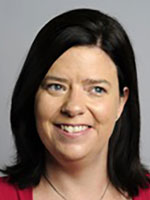
Nicole M. Davis, PhD. BCBA LABA

Maeve Donnelly
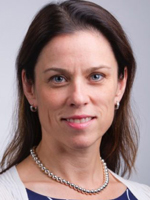
Laura Dudley, PhD. BCBA-D LABA
By enrolling in Northeastern, you’ll gain access to students at 13 campus locations, 300,000+ alumni, and 3,000 employer partners worldwide. Our global university system provides students unique opportunities to think locally and act globally while serving as a platform for scaling ideas, talent, and solutions.
Below is a look at where our Psychology & Mental Health alumni work, the positions they hold, and the skills they bring to their organization.
Where They Work
- Behavior Analysis, Inc.
- Behavior Based Learning, LLC
- Boston Public Schools
- UMass Medical School
- The New England Center for Children
What They Do
- Healthcare Services
- Community and Social Services
- Business Development
- Entrepreneurship
What They're Skilled At
- Mental Health
- Psychotherapy
- Public Speaking
Learn more about Northeastern Alumni on Linkedin .
Related Articles

5 Alternative Careers For Psychology Majors that Aren’t Counseling

5 Research Careers With a Master’s in Psychology

Is Getting a DPT Worth It?
When you make a gift on Giving Day , you're supporting the area of campus that means the most to you, and with various matching gift challenges throughout the day , you have the opportunity to make your gift go even further.
For more information visit www.husson.edu/ givingday and be sure to join us on April 3!
- Eagle Connect

Preparing for Your Psychology Master's Degree Interview
Published on: February 14, 2024

You've worked hard to prepare for an amazing graduate school psychology program: studying for the GRE, submitting applications and writing personal statements. All that effort has paid off, and your application has attracted attention. Remember, not everyone gets the chance to move past the first step of the grad school application process. This is a huge honor and you should feel proud.
The hard work is just beginning, however. Now that your application has hit the mark, it's time to embark on an equally challenging process — preparing for your graduate school interview. This is a powerful opportunity. You get to learn more about the program and determine whether it's a good fit, while faculty members discover what makes you an excellent candidate for their program.
It's natural to be nervous, but if this process is framed as an exciting opportunity, you will be eager to put in the effort. Below, we will reveal how to prepare for a grad school interview, especially if you hope to study psychology as a master's student.
Get Your Applied Psychology Degree
Understanding the Importance of Interviews for Master's Degrees
Graduate program applications showcase your academic and professional experience, but there is only so much you can convey through test scores, resumes or letters of recommendation.
At some point, faculty members will want to get to know the real you. This is where the master's degree interview allows you to shine.
How the Interview Process Works
The interview process can look a bit different from one graduate program to the next, but most provide a basic opportunity to interact with faculty members and expand upon information initially shared in your psychology master's application.
Depending on the program in question, you may meet with one or two faculty members or with a full committee that could include current graduate students. The interview may feel conversational with the interviewers striving to put you at ease so you can reveal your genuine personality.
Grad school interviews often run at least half an hour. These interviews traditionally take place in person, but there is now a greater willingness to accommodate virtual formats. Both call for extensive preparation with audiovisual concerns also coming into play for virtual sessions.
What Interviewers Are Looking For
No one skill or accomplishment will automatically spell success, but interviewers tend to keep an eye out for these qualities when meeting with aspiring graduate psychology students:
- Authenticity . Interviewers have little interest in overly rehearsed answers. They want a glimpse into your true personality. Although it can be tempting to 'play the part' of somebody more qualified, this is not wise. You want to know if the program is a good fit, so this will be difficult to assess if you aren't true to yourself.
- Confidence . A lack of confidence can be a real liability, no matter how qualified you are for the psychology program. If you come across as timid or unsure, interviewers are likely to underestimate you. Eye contact, body language and tone of voice play heavily into how you are perceived and remembered.
- Passion . Don't be afraid to put your full passion on display. After all, grad students deeply fascinated by and drawn to psychology are the most likely to continue giving it their all when the going gets tough. Interviewers may be especially intrigued by research interest areas, so feel free to reveal which topics or niches you find compelling.
How to Prepare for a Psychology Grad School Interview
Now that you understand the basic components of a successful grad school interview, it's time to start preparing. Sooner is always better as it takes time to conduct research, get in touch with a trusted faculty member and set grad school goals that help you answer key questions with confidence. These steps are especially important.
Research the Psychology Program
Research is a must for any interview, but especially when applying to grad school. This means taking a deep dive into curricula, course requirements, accreditation and overarching philosophies or values. Your takeaways will determine how you answer key questions and where you find common ground with the interviewer.
Practice Common Interview Questions
No one question is guaranteed to appear in every grad school interview, but certain topics are more likely to take center stage. The more prepared you are for these areas of focus, the less flustered you'll feel. Prior to the interview, take a close look at common questions (which is highlighted in more detail below). Consider journaling about these to reveal your true thoughts and opinions.
Avoid the urge to write and memorize your answers word-for-word as you don't want to sound overly rehearsed. This would prevent you from genuinely connecting with the interviewers. Practice should encompass not only what you say but also how you say it. Consider taping yourself so you can determine how you need to change.
Connect With Faculty and Students
There is only so much you can learn from official college catalogs, brochures and other materials. Should you want an inside look at a particular graduate psychology program, ask those currently immersed in the academic environment, like grad students and faculty members.
LinkedIn can be an excellent resource, so don't hesitate to search for current graduate students and send friendly messages. This is your chance to inquire about the program and to get the inside details on what exactly sets it apart. Ask about the student experience including which resources are available, how demanding the coursework is and which classes or experiences are most compelling.
Formulate Your Career Goals and Aspirations
You will almost certainly be asked about your career plans and, while you don't need to have every detail drawn up just yet, you should have a basic idea of what you want to accomplish as a psychology grad student and in future professional pursuits.
Take some time to brainstorm your future, touching on possible research topics, career fields and other opportunities. Use these insights to develop achievable, yet accessible goals that align with your preferred psychology programs.
Prepare Questions to Ask
It sounds cliche, but nearly every interviewer eventually encourages interviewees to ask questions of their own. This is your chance to reveal in-demand qualities such as attention to detail.
Questions will ideally be tailored to reflect the specifics of the psychology program but should also convey that you genuinely want to learn more. Examples of questions worth asking include:
- What are the scheduling expectations for this program? Are grad students expected to be flexible? How is work-life balance encouraged or maintained?
- What is this psychology program's advising philosophy? How does this play out in interactions between advisors and grad school students?
- Can you tell me about available research opportunities and how previous students have taken advantage of them?
On the Day of the Interview
Don't let nerves get in the way of a great interview; with the right attire and attitude, you can make a powerful impression. Follow these day-of suggestions to give yourself an extra edge.
Dress for Success
Your attire can play a huge role in how you're perceived. As with any formal interview, you will want to maintain a crisp and professional appearance. This begins with strong hygiene but also means developing a put-together outfit that conveys both your professionalism and personality.
When in doubt, button-up shirts, slacks or suit jackets are safe. A great fit is also important. Consider investing in tailoring if you struggle to find flattering attire. These standards hold true for video-based interviews. When you dress the part, you will feel more confident and that confidence alone will help you make a much stronger impression.
Manage Stress and Nerves
A great outfit can provide a much-needed burst of confidence, but you may need to call on a variety of other strategies to keep your stress in check. Deep breathing can be particularly effective. Focus on your breath, ideally in a quiet location. Breathe through your nose and into your lower belly, allowing ruminations and mental chatter to float away.
Other calming methods might include chatting on the phone with loved ones or listening to inspirational music. Avoid the urge to continue researching and rehearsing answers to common interview questions. This is helpful in the weeks leading up to the interview, but on the day of, it may only lead to more anxiety.
Common Graduate School Interview Questions
As you prepare for the interview process, you will want to have a basic idea of what interviewers might ask. This will differ between programs, but in general, interviewers can be expected to touch on the reasons underscoring your interest in the program and inquire about your plans. Possible graduate school interview questions include:
- What attracted you to our psychology program? This is your chance to reveal why you want to study psychology at the master's level and what you find appealing about the college and the program in question.
- How will you contribute to our program? As a graduate student, you have a powerful opportunity to give back as you develop high-level skills. Use this opportunity to highlight your research interest areas and how they align with the psychology program in question.
- Where do you see yourself in five years? This question encourages you to examine how you'll navigate the professional world following graduation. Be sure to share the ambitious vision that will ultimately guide your graduate school experience. Convey how exactly you want to draw on your newly developed skills and knowledge to help others.
- What are your weaknesses as a student and how will you overcome them? Self-aware students are among the most successful, and having completed your bachelor's, you should have an in-depth understanding of what you find challenging about the college experience and which strategies are the most helpful for overcoming these concerns. Be honest but make it clear you've put in the work and come a long way.
Following Up After a Psychology Program Interview
After a successful interview, you deserve a moment to celebrate. Next, send a quick message to the interviewer to express your gratitude. Not everybody gets the opportunity to interview for master's degree programs, so you don't want to take this for granted. Your thank you should be brief, but genuine. Show appreciation for the interviewer's time and restate your interest in the psychology program.
Prepare for Your Graduate Student Journey at Husson
At Husson University, we provide a variety of online programs designed to spark your passion and expand your skill set. Our goal is to help prepare our graduate students for a bright future as an accomplished professional. Reach out today to learn more about our highly regarded undergraduate and graduate degree programs .
Select a Program
Related posts.
Psychology Jobs Guide: Understanding Mental Health Careers
Exciting Jobs You Could Get With a Psychology Major
3 Exciting New Careers in Nutritional Psychology
How to Become a Psychiatric Mental Health Nurse Practitioner

Online Bachelor's in Psychology
Find your ideal career path with a psychology degree.
If you want to better understand yourself and those around you, the versatility of a psychology degree will open a diverse career path based on your interests and goals. With the online bachelor’s in psychology, you will employ a variety of lenses – including biological, cognitive, developmental, social and personality – to appreciate why people do what they do while building expertise in scientific methods, critical thinking and statistical procedures.
Quick Facts
Apply for: Fall 2024 Start class: September 4, 2024

What you will learn in an Online Psychology Degree
With Montclair’s BA in Psychology, you will gain valuable skills in critical thinking, problem-solving, and empathy, which can be applied in your personal and professional lives. Explore topics like cognition, emotion, social dynamics, and mental health to build an understanding of the world around you to make a positive impact on individuals and communities.
View Courses

Who should apply to a BA in Psychology?
Understanding human behavior is an asset in any job. With our online psychology degree, you will have the flexibility to balance your busy lives while developing the critical thinking, communication, and problem-solving skills that are applicable in a wide range of professions.
Admission Requirements
Explore psychology careers.
An online Bachelor of Arts in Psychology opens up various career paths, including roles in social services, marketing research, counseling, mental health, and education. Our psychology graduates have found success in a wide variety of fields, such as business, finance, human resources, and communications. Pursuing further education opens additional opportunities for careers in clinical psychology, counseling psychology, or research.

Our focus is your success.
Our psychology degree program is designed with you in mind. Course content is delivered in a self-paced, asynchronous format and allows you to engage and collaborate with faculty and classmates fully online. Schedules are geared toward working professionals combining convenience with personalized support from a success coach. Move forward with your degree with a flexible schedule and career support every step of the way.
- Submit Online Application
- Transcript: One from each college attended
About the Psychology Department
With more than 1,500 undergraduate majors, Psychology is one of the most popular majors at Montclair that can lead to a satisfying career in a wide variety of fields. The Psychology Department faculty have expertise in a range of disciplines within the psychological sciences, including clinical, experimental, forensic, industrial-organizational, and school psychology. Our faculty are dedicated to supporting the success of our students.

For more information, please contact Montclair Online. Email: [email protected] Phone: 973-655-7110
Psychology Program Advisor
Schedule an Appointment Chat with Us Request Information

Stipends for doctoral students of psychology have not kept pace with cost of living in the U.S., study finds
A n online survey of doctoral students in psychology across the U.S. has shown that their annual stipends are not keeping pace with the rising cost of living. More than 80% of these students reported taking on additional debt to cover their living expenses. The survey also found that students who were more concerned about their financial situation were more likely to postpone getting married or having children and were also more likely to forego medical or mental health care. The paper was published in the Journal of Clinical Psychology .
The cost of higher education in the United States has risen dramatically over the past several decades. Since the 1980s, tuition and fees at both public and private colleges and universities have increased by as much as 250%, which is a rate far exceeding inflation. For the 2021-2022 academic year, the average cost of tuition and fees was $38,185 at private colleges and $10,338 for state residents at public colleges.
This rise in costs has been driven by factors such as increased demand for higher education, reductions in state funding for public institutions, growing administrative expenses, and investments in facilities and technology. The escalating cost of higher education has led to a significant increase in student loan debt, which has become a major financial burden for many Americans.
In 2021, total student loan debt in the U.S. was estimated to be over $1.7 trillion. With around 44 million borrowers, the average debt is around $38,000 per borrower. This rising cost of higher education and the associated debt has sparked an ongoing debate about the value of a university degree and the need to reform the higher education system.
Research focusing on graduate psychology students has revealed that their debt levels have escalated from between $20,000-$60,000 around the turn of the millennium to recent estimates exceeding $122,000 and $231,000 for PhD and PsyD students, respectively. This level of debt is in stark contrast to the median annual salary for clinical psychologists, which stands at $90,000.
Study author Erica Szkody and her colleagues wanted to further explore the financial stress and debt situations of doctoral students in clinical psychology. They were interested in understanding the sources of funding and financial support these students receive, how they manage their finances, and the impact of financial stress on their future plans and mental health. They sought detailed insights through an online survey.
The survey included 912 doctoral students from scientist-practitioner and clinical scientist psychology graduate programs in the U.S., with 82% identifying as female and 73% as White. The participants represented a diverse geographical distribution across the country.
The survey inquired about the students’ incomes, including stipends, part-time employment, savings, and other sources of income, as well as their expenses, such as daily living costs, work and education-related expenditures, and their level of debt. It also explored issues related to financial stress, including delays in achieving life milestones due to financial concerns, living arrangements, and assessments related to financial hardship, depression, anxiety, substance abuse, sleep patterns, and sleep difficulties.
The findings indicated that half of the students received stipends covering all 12 months of the year, while 39% received support for 9 months. Despite variations in funding during the summer, over half of the participants reported some form of support. Savings among students varied significantly, with 50% reporting up to $5,000 in savings and 15% having none. Financial support from friends, family, partners, or child support was crucial for 72% of the students, especially during the summer months.
Despite program restrictions on part-time employment, 28% of students reported having part-time jobs at some point. Only 5% had no undergraduate student loan debt, and 19% had not taken out graduate student loans. The average loan size reported was around $77,000, with some students reporting debts as high as $500,000.
Most students shared housing with roommates, family members, or friends, with 86% renting homes or apartments. The average annual expenditure for students was approximately $17,500, against an average reported income of about $21,500, leaving them with around $4,000 in expendable pre-tax income. However, about 35% reported having no expendable income.
Approximately 43% of participants expressed significant stress about their financial debt, and 16% seriously considered discontinuing their doctoral studies due to financial difficulties. About half of the participants delayed life milestones due to financial concerns, most commonly postponing marriage, starting a family, having children, and participating in social activities.
Further analysis revealed that lower stipends, greater debt, and smaller savings were linked to higher financial stress and more time spent worrying about financial issues. Greater financial concerns were associated with higher levels of depression and anxiety, as well as reduced sleep quality.
“This study illustrates the inadequacy of current financial support for clinical psychology doctoral students,” the study authors concluded. “Most of the sample reported receiving a stipend that required them to take out significant loans during graduate school, which contributed to debt and financial stress.”
“We also now know that financial stress is related to symptoms of depression and anxiety, and poor sleep for clinical psychology doctoral students, as well as avoiding seeking proper health care, which makes financial stress in graduate school a topic of critical importance. University and program leadership are encouraged to advocate for increased financial support, as well as improve financial transparency and access to health care.”
The study sheds light on an important predicament current doctoral students face. However, it should be noted that study participants were exclusively students from clinical psychology programs that were members of the Council of University Directors of Clinical Psychology. Results might be somewhat different on students of other programs.
The paper, “ Financial stress and debt in clinical psychology doctoral students, ” was authored by Erica Szkody, Steven Hobaica, Sarah Owens, Jennifer Boland, Jason J. Washburn, and Debora Bell.


IMAGES
VIDEO
COMMENTS
Students in the Jungian Psychology and Archetypal Studies Specialization. ... As with any graduate program, you will do assigned reading for each week of the program. The number of books and articles will vary by instructor, but in general expect between 800-1,000 pages of reading per course, or approximately 100-150 pages per week. ...
TH 610 Ph.D. Dissertation - 25,000 word minimum. Upon completion of the required credits of core curriculum courses at the 600 level, the student will prepare a 25,000-word dissertation in a publishable format following Westbrook University's published guidelines. The dissertation will reflect the student's theoretical and practical ...
Download the NEW M.A./Ph.D. Specialization in Jungian & Archetypal Studies Information Guide. This rigorous, creative exploration of Jungian and archetypal psychology provides students with a range of theories, skills, and practices they can apply directly to their professional, personal, and creative lives, while addressing the collective ...
In partnership with The Jung Center of Houston, Saybrook Graduate School and Research Center (San Francisco) will offer fully-accredited MA and PhD degrees in psychology with a concentration in Jungian studies starting in fall 2008. Melding Saybrook's at-a-distance learning with The Jung Center's in-person seminars, this specialization ...
Analytical psychology, also called Jungian psychology, is a school of thought within clinical and counseling psychology. It was founded by Carl Jung, a Swiss psychiatrist, as an offshoot of Freudian psychology. Jung introduced concepts like the personal unconscious, collective unconscious, psychological complex, anima and animus.
Daniel Anderson, PhD, is a clinical psychologist with training and experience in Jungian psychology, dreamwork, symbolism, adult and child-adolescent psychology, play therapy, and parent work. Dr. Anderson trained in Jungian analysis in Zürich, Switzerland and received his PhD in clinical psychology from Pacifica Graduate Institute in California.
Complete the form to access the Jungian and Archetypal Studies Specialization Information Guide. Discover: archetypes and the process of individuation. the unique coursework in this specialization. an academic format designed for the working student and the meaning behind the hybrid learning model. the ways in which students are bringing this ...
Introduction to Depth Psychology - DJA 700, 3 Units Jungian Psychology: The Individuation Journey - DJA 720, 3 Units C.G. Jung in Context - DJA 710, 3 Units Dreamwork: Tending the Living Images - DJA 825, 3 Units Archetypes: Universal Patterns of the Psyche - DJA 800, 3 Units Mythopoetic Imagination: Viewing Film, Art, and Literature from
A Fresh Look at The Red Book: Reading the Liber Novus with Jungian Psychoanalysts. $ 120.00 - $ 195.00. Online Only Daniel Ross, PMHNP, Boris Matthews, PhD, LCSW, NCPsyA, and Guest Jungian Psychoanalysts 6 Monthly Saturdays, 9am-12pm Jan 27, Feb 24, Mar 30, Apr 20, May 25, Jun 29 CEs Available. This program will be recorded.
The Jungian Psychotherapy Program (JPP) and the Jungian Studies Program (JSP) are concurrent two-year programs where participants together study the fundamentals of Jungian theory grounded in experiential learning.The JPP/JSP training year, which runs from October to June, provides learners 144 hours of instruction in Jungian theory, 54 hours of Small Group, and 36 hours of Large Process Group*.
This is an online version of our MA Jungian and Post-Jungian Studies at University of Essex. This course is taught through distance learning meaning the entire course is taught online with no face-to-face, in-person teaching (This applies to both the full and part-time variant.) University of Essex. Colchester , England , United Kingdom.
NU offers a 100% online program for a PhD in Psychology that is designed to answer the growing interest in the field of psychology. It seeks to prepare graduates to stand out and excel in the profession. Training includes applied experiential learning with case studies, scenarios, and real-life situations.
Jeffrey T. Kiehl, Ph.D. is a diplomate Jungian analyst with both the C.G. Jung Institute of Colorado and the Inter-Regional Society of Jungian Analysts and a member of the International Association of Analytical Psychology. He originally trained in theoretical physics and then worked as climate scientist for 40 years.
Dr. James Newell is a gifted teacher Bonnie Bright, PhD, founder of the Depth Psychology Alliance Dr. James Newell is a gifted teacher and scholar who has effectively organized an impressive amount of detailed research and information into a series of powerful classes and courses on Jung and Jung's psychology, now available on Depth Psychology Academy.
Welcome to the Jung Page. Begun in 1995 by Jungian analyst Don Williams, The Jung Page provides online educational resources for the Jungian community around the world. With the cooperation and generosity of analysts, academics, independent scholars and commentators, and the editors of several Jungian journals, The Jung Page provides a place to ...
With an MA, PhD, or certificate program focusing on Jungian psychology, you can augment your clinical practice or expand your knowledge of C.G. Jung, one of the seminal leaders in psychological theory and history. The Jungian Studies program is designed for those who wish to have a deeper understanding of analytical psychology and its ...
The programs on this list vary greatly in terms of cost. On the high end, the Chicago School at Los Angeles charges $1,703 per credit. At $528 per credit, Keiser University-Ft. Lauderdale offers ...
The course lays the foundations for an understanding of human psychology and an exploration of the structure of the psyche as discovered and developed by C.G.Jung. The C.G. Jung Centre of Ireland was founded in 1990 with the guidance and inspiration of Sir Laurens van der Post, diplomat, close friend of C.G. Jung, and author of 'Jung and The ...
Best Online Ph.D. Programs in Organizational Psychology. Liberty University. The Chicago School at Los Angeles. Keiser University-Ft Lauderdale. Adler University. 1.
This online program includes seven core courses in behavior analysis plus an additional three courses that extend the student's familiarity with clinical procedures and with the research supporting their use. ... The MS in ABA program at NU has provided me with great exposure to varied settings of applied psychology. I will be finishing the ...
Show appreciation for the interviewer's time and restate your interest in the psychology program. Prepare for Your Graduate Student Journey at Husson. At Husson University, we provide a variety of online programs designed to spark your passion and expand your skill set. Our goal is to help prepare our graduate students for a bright future as an ...
Explore Psychology Careers. An online Bachelor of Arts in Psychology opens up various career paths, including roles in social services, marketing research, counseling, mental health, and education. Our psychology graduates have found success in a wide variety of fields, such as business, finance, human resources, and communications.
An online survey of doctoral students in psychology across the U.S. has shown that their annual stipends are not keeping pace with the rising cost of living. ... Research focusing on graduate ...